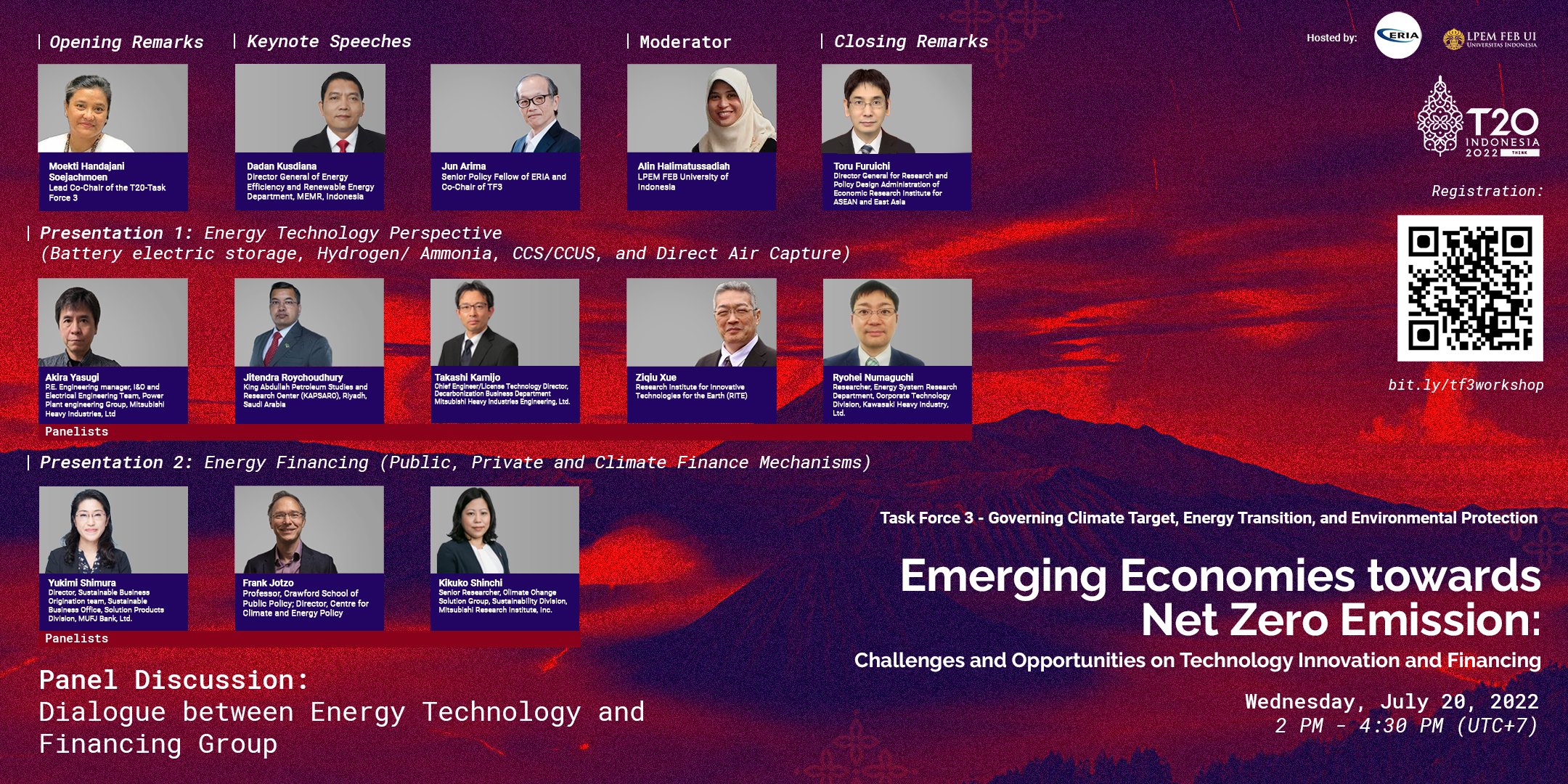Upcoming events.
The 9th Asia CCUS Network (ACN) Knowledge Sharing Conference
“Australia Experience on CCUS: Middle Arm- The Northern Territory’s CCS Hub”
Friday, 30 June 2023 | 13:30 – 14:30 (UTC+7) Jakarta Standard Time
The Asia CCUS Network was successfully launched on 22-23rd June 2021. Currently 14 countries (all ASEAN member countries, the United States, Australia, India and Japan) and more than 100 international organisations, companies, financial and research institutions are joining the Network. Members share the vision of CCUS development throughout the Asian region, and the Asia CCUS Network aims to contribute through the collaboration and cooperation on development and deployment of CCUS through organizing knowledge sharing conference regarding CCUS.
The Australian Government is very committed to contribute to the reduction of emission in lined with the Paris agreement in which clean technology such as CCUS and Direct Air Capture are amongst technologies very crucial to help countries and the regions to reach the net zero emission by 2050 as pledged in the recent COP 26 and COP 27. Translating this commitment into a practical programmes and projects to accelerate the development and deployment of CCUS, the Australian Government has launched an AUD 250 million program to deploy carbon capture, use and storage (CCUS) at scale. Within the EAS’s region, Australia is working hard to be one of the CCUS Hubs that could boost Australia’s CCUS capabilities through encouraging domestic and international research collaborations and lowering the cost of technology adoption. The Australia government has initiated the Carbon Capture, Use and Storage Development Fund which could provide businesses with grants of up AUD 25 million for pilot projects or pre-commercial projects aimed at reducing emissions.
The Northern Territory has huge potential to be a world-class gas production, manufacturing, and service hub. In this regard, the Territory aims to have AUD 40 billion economy by 2030, based largely on gas but tied to the commitment of net zero emissions by 2050.
The Northern Territory has identified gas reserves in excess of 30Tcf offshore and more than 500Tcf (OGIP) onshore. The new economy will be developed at Middle Arm in line with the objectives of climate change management. Incorporation of the industrial ecology approach that included CCS was instrumental in acquiring AUD 1.5 billion funding for enabling infrastructure required for the Low Emissions Hub. Part of the planning includes a multi-user facility for domestic and international CO2 disposal. Key activities have been laid out for the CCS hub in the Northern Territory such as (1) Decarbonisation Working Group to develop a Low Emissions Industrial Hub at Middle Arm; (2) Collaborating with the Timor-Leste Government and the LNG industry to secure access to the Bayu-Undan field as a CO2 depository; and (3) Collaborating with the Australian Government and LNG industry to secure additional CO2 storage capacity in North Australian waters.
The Northern Territory CCS hub - the Middle Arm CCS facility - is being designed for the recovery of >25Mtpa by 2040, which will be more than sufficient to address the Northern Territory’s CO2 emissions. At current industry rates of CO2, the offshore fields have (unproven) potential to capture the Northern Territory’s emissions for more than 1500 years.
To learn more about the experience from the Northern Territory CCS hub, the Secretariat of ACN has been pleased to invite Dr Howard Smith, Director Industrial Ecologies and Government Lead Carbon Capture Utilisation and Storage (CCUS), Gas Taskforce Unit, Department of the Chief Minister and Cabinet, Northern Territory Government, to share the update development and knowledge on CCS hub in the Northern Territory, Australia. This conference aims to share the experience from Australia on CCUS policy development as well as challenges from the demonstration projects.
Agenda
(UTC+7, Jakarta Standard Time)
13:30 – 13:35 Opening
Shigeru Kimura, Special Advisor on Energy Affairs, ERIA.
13:35 – 14:00 Middle Arm – The Northern Territory’s CCS Hub
presented by Dr Howard Smith, Director Industrial Ecologies and Government Lead Carbon Capture Utilisation and Storage (CCUS), Gas Taskforce Unit, Department of the Chief Minister and Cabinet, Northern Territory Government.
(Moderated by I Gusti Suarnaya Sidemen, ERIA Expert on CCS/CCUS)
14:00 – 14:25 Open discussion Session
14:25 - 14:30 Closing Remarks by Han Phoumin, Senior Energy Economist, ERIA.
.png)
The 8th Asia CCUS Network (ACN) Knowledge Sharing Conference
‘Huff and Puff CO2 EOR: Small Field Solution to improve production and reduce emission’
Thursday, 13 April 2023 | 13:00 – 14:30 (UTC+7), 15:00 – 16:30 (UTC+9) - Webinar via Zoom
There are two type CCS EOR or EGR, CO2 flooding and Huff and Puff (HnP). During the CO2 flooding mode, CO2 is injected through one injection well, and oil and gas will be produced from one production well. Injected CO2 will break through from the injection well to the production well along the fractures or high permeability channels in reservoirs and improve the recovery factor of oil and gas in place. Meanwhile, CO2 HnP uses one well as both injection well and production well to avoid gas break through. The HnP process consist of three stages process: gas injection stage, well soaking stage, and production stage. HnP has been known since 1960s, but the development of the technology is relatively slow due to available easier and cheaper to produces resources and lack of CO2 resources. However, since most oil fields depleted, HnP bring a new alternative to bring small fields and unconventional resources into production possible. Former studies indicated that CO2 HnP has the advantages of strong pertinence, short cycle, and fast capital recovery. Those advantages could bring HnP good solution for increasing oil and gas production and reducing CO2 emission in Asia.
Pertamina of Indonesia has conduct research and pilot projects for HnP CO2 EGR and EOR for several times kindly sharing the experiences and sharing a collaborative opportunity for promoting CCUS in Asia.
The conference will promote knowledge-sharing on the HnP CCUS technology, challenges and opportunities and the policy and regulation needed to support its massive deployment. It is co-hosted by ACN and Pertamina. It will include presentation of the Pertamina experiences in preparing suitable fields, decision to implement HnP technology and lesson learned in its endeavor, and potential collaboration may arise.
Agenda
(UTC+7, Western Indonesian Time)
13:00 – 13:15 Opening and Welcoming remarks
Shigeru Kimura, Special Advisor to President on Energy Affairs, ERIA
13:15 – 14:00 Presentation “Huff and Puff CO2 EOR: Small Field Solution to improve production and reduce emission” by PERTAMINA
Merry Marteighianti, Vice President Research & technology Innovation
Debby Halinda, Expert, Research & technology Innovation
(Moderated by: I Gusti Suarnaya Sidemen, ERIA Expert on CCS/CCUS)
14:00 – 14:10 Commentary session - Project Collaborator by Kazuaki Mikami, Reservoir Engineer/Deputy Director, Subsurface Division, Hydrogen and CCS Project Department, JOGMEC
14:10 – 14:25 Open discussion Session
14:25 - 14:30 Closing Remarks by Han Phoumin, Senior Energy Economist, ERIA
The 7th Asia CCUS Network (ACN) Knowledge Sharing Conference
‘CCS Screening in Southeast Asia using Regional Database’
Thursday, 16 February 2023 | 13:00 – 14:15 (UTC+7), 15:00 – 16:15 (UTC+9) - Online Conference
Carbon dioxides capture and storage (CCS), a technology that captures and stably stores carbon dioxide deep underground for long periods of time, is considered to play an important role in achieving decarbonization. To select suitable CO2 storage sites for CCS, subsurface data such as seismic and well data are often used for site screening and selection but evaluating wide region using subsurface data takes time. Furthermore, since availability of subsurface data is normally not uniform, it is sometimes difficult to obtain evaluation with uniform criteria and data for the whole area of interest.
Therefore, to enable the screening study over a broad area using uniform criteria, JOGMEC have conducted the assessment for CCS screening in Southeast Asia using regional geological database (Neftex by Halliburton). A regional scale assessment was conducted for the entire Southeast Asia region as Phase 1 and a basin scale assessment as Phase 2. In Phase 1, basins of Southeast Asia were ranked based on conditions of suitability. Considering Phase 1 result and the location of CO2 emission sources, twenty-three target formations/intervals in thirteen sedimentary basins were selected for Phase 2. The results of Phase 2 were summarized as a fairway map showing the geological suitability of CCS and CO2 storage capacity estimated based on simple volumetric method for each target formation/interval. The results of Phase 1 are consistent with the location of planned CCS & CCUS projects in Southeast Asia, indicating the potential utility of this methodology for site screening at the regional scale. Phase 2 methodology could be used to identify CCS suitable areas by formation and to calculate rough estimation of the storage volume. The methodology used in this study allows for consistent site screening for CCS over a wide area.
This conference aims to share the JOGMEC’s experience on the CCS screening methodology and the assessment results in the Southeast Asia.
Agenda
(UTC+7, Jakarta Time)
13:00 – 13:10 Opening and Welcoming remarks
Shigeru Kimura, Special Advisor to President on Energy Affairs, ERIA (3-5 minutes)
Ayato Kato, Director, Overseas Exploration Division, Exploration Department, Energy Business Unit, JOGMEC (3-5 minutes)
13:10 – 13:45 Panel Discussion on “Regional CCS Screening Using Regional Database”
by Ryoko Setoguchi, Overseas Exploration Division, Exploration Department,
Energy Business Unit, JOGMEC
Moderator: Han Phoumin, Senior Energy Economist, ERIA
13:45 – 13:55 Commentator by Mohammad Rachmat Sule, Manager of National Center
of Excellence for CCS, CCUS - Institute of Technology Bandung (ITB),
Indonesia.
13:55 – 14:10 Open discussion Session
14:10 - 14:15 Closing Remarks by Han Phoumin, Senior Energy Economist, ERIA
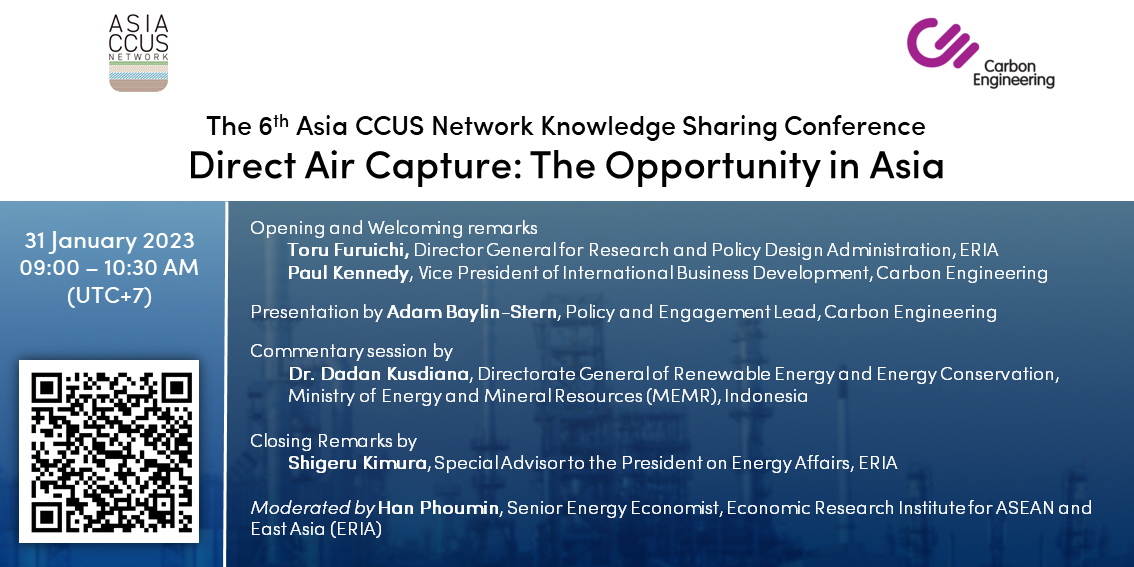
The 6th Asia CCUS Network (ACN) Knowledge Sharing Conference
“Direct Air Capture: The Opportunity in Asia”
Tuesday, 31 January 2023 | 09:00 – 10:30 (UTC+7) - Online Conference
Carbon Capture, Utilisation and Storage (CCUS) technologies are expected to play an important role in supporting clean energy transitions across Asia as an emissions reductions pathway for fossil-fuel intensive power and industry sectors. Direct Air Capture (DAC) technology is expected to support the transition with carbon removals to counterbalance residual emissions through technologies.
Many countries around the world have committed to the energy transition as reflected in their NDCs although some countries have yet to pledge any specific target year for carbon neutrality. However, not only developed countries have committed to carbon neutrality, but many countries in the developing world also fully committed to making the energy transition from a fossil fuels-based energy system towards cleaner and greener energy systems in which more renewable energies such as wind, solar, hydropower, biomass, and other clean fuels will have a larger share in the energy mix.
Unlike capturing emissions from industrial flue stacks, DAC technology captures carbon dioxide (CO2) directly from the atmospheric air around us, through a series of chemical reactions, delivering it in a pure compressed stream suitable for storage or use. This can help counteract CO2 emissions that are technologically challenging or prohibitively expensive to abate and address the large quantities of CO2 emitted in the past that remains trapped in our atmosphere. Leading international organizations such as the Intergovernmental Panel on Climate Change (IPCC) and International Energy Agency (IEA) are highlighting the importance of high integrity, technology-based carbon removals in pursuit of these goals. The IPCC Sixth Assessment Report on mitigating climate change has stated that the direct removal of carbon dioxide from the atmosphere is now “unavoidable”; in order to reach our climate targets, we must both reduce emissions at source and also remove carbon dioxide from the atmosphere at large scale. The remaining emissions from fossil fuel combustion including power generation or industrial facilities that use fossil fuels, will need to be captured and transported to storage through CCUS technologies or through the Direct Air Capture technologies (around 2 Gt CO2 are removed in 2050 by technology-based CDR in the IEA’s Net Zero Scenario).
The conference will promote knowledge-sharing on the DAC technology and the policy and regulation needed to support its large-scale deployment. It is co-hosted by ACN and Carbon Engineering, a Canadian climate solutions company, which has been focused since 2009 on developing DAC technology and commercializing it globally at large-scale, working alongside local partners. It will include presentation of the company’s technology and business developments, and discussion of the opportunity that exists to deploy DAC in Asia as it accelerates its clean energy transition. The session will also explore possibilities for countries to pursue international and regional co-operation opportunities to be suppliers of high integrity CO2 removal, and to unlock associated economic and job opportunities
Agenda
(UTC+7, Western Indonesia time)
09:00 – 09:15 Opening and Welcoming remarks
Shigeru Kimura, Special Advisor to the President on Energy Affairs, ERIA
Paul Kennedy, Vice President of International Business Development, Carbon Engineering
09:15 – 10:00 Panel Discussion on “Direct Air Capture: the opportunities in Asia”
Moderator: Han Phoumin, Senior Energy Economist, ERIA
Panelist: Adam Baylin-Stern, Policy and Engagement Lead, Carbon Engineering
10:00 – 10:10 Commentary Session
Dr Dadan Kusdiana, Directorate General of Renewable Energy and Energy Conservation, Ministry of Energy and Mineral Resources (MEMR)
10:10 – 10:25 Q&A
10:25 – 10:30 Closing Remarks
Han Phoumin, Senior Energy Economist, ERIA
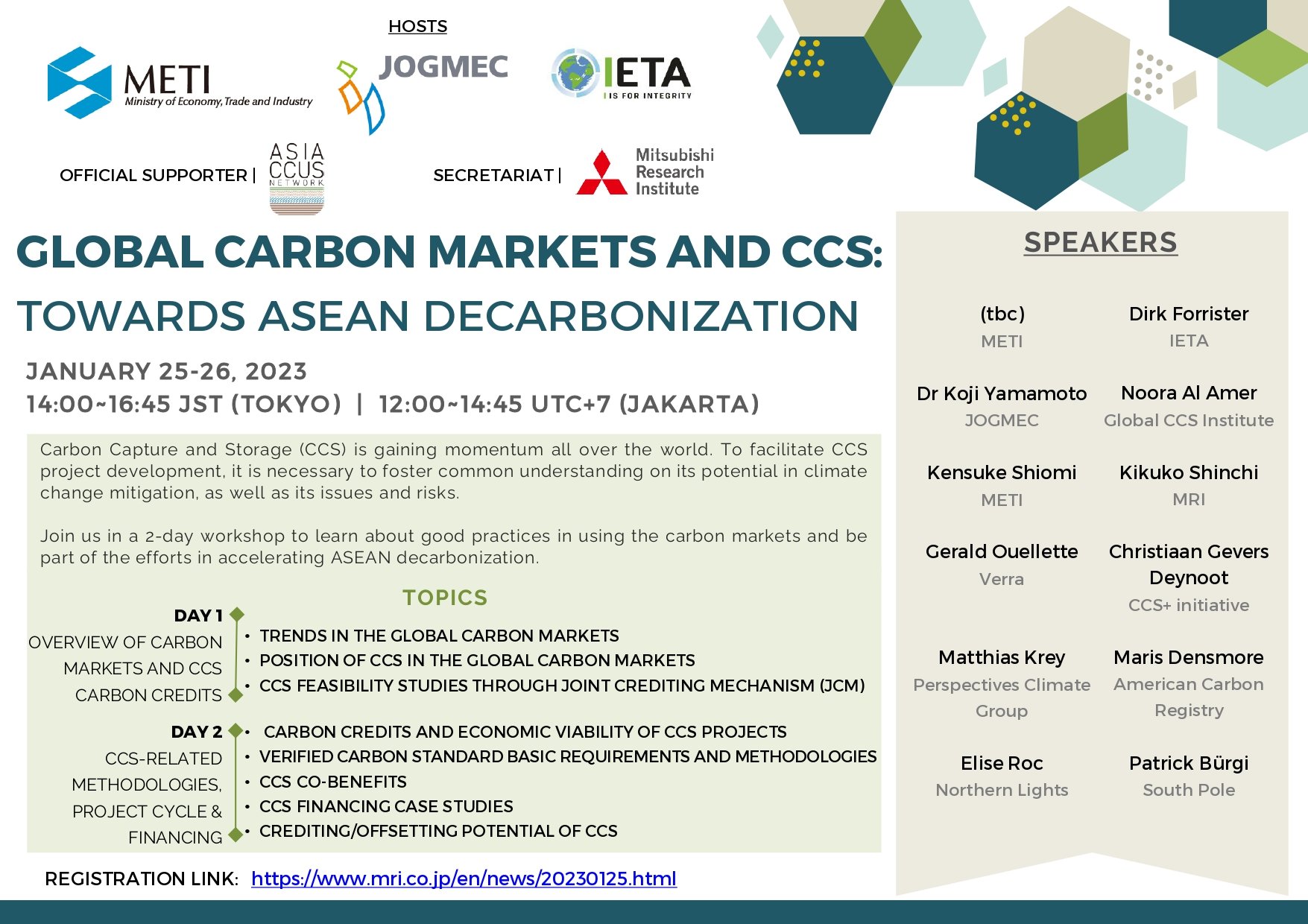
Global Carbon Market and CCS - Towards ASEAN Decarbonization
Carbon Capture and Storage (CCS) is gaining momentum all over the world. To facilitate CCS project development, it is necessary to foster common understanding on its potential in climate change mitigation, as well as its issues and risks.
Join us in a 2-day workshop to learn about good practices in using the carbon markets and be part of the efforts in accelerating ASEAN decarbonization.
Day 1 : 25 January 2023
Overview of Carbon Markets and CCS Carbon Credits
Trends in the global carbon markets
Position of CCS in the global carbon markets
CCS feasibility studies through join crediting mechanism (JCM)
Day 2: 26 January 2023
CCS-related Methodologies, Project Cycle & Financing
Carbon credits and economics viability of CCS projects
Verified carbon standard basic requirements and methodologies
CCS co-benefits
CCS financing case studies
Crediting/ offsetting potential of CCS
Speakers from:
Ministry of Economy, Trade and Industry (METI), Japan
JOGMEG (Japan Organization for Metals and Energy Security)
Global CCS Institute (GCCSI)
IETA (International Emissions Trading Association)
Verra (Verified Carbon Standard)
MRI (Mitsubishi Research Institute)
CCS+ initiative
Perspectives Climate Group
American Carbon Registry
Northern Lights
South Pole
Further information about the event can be found here
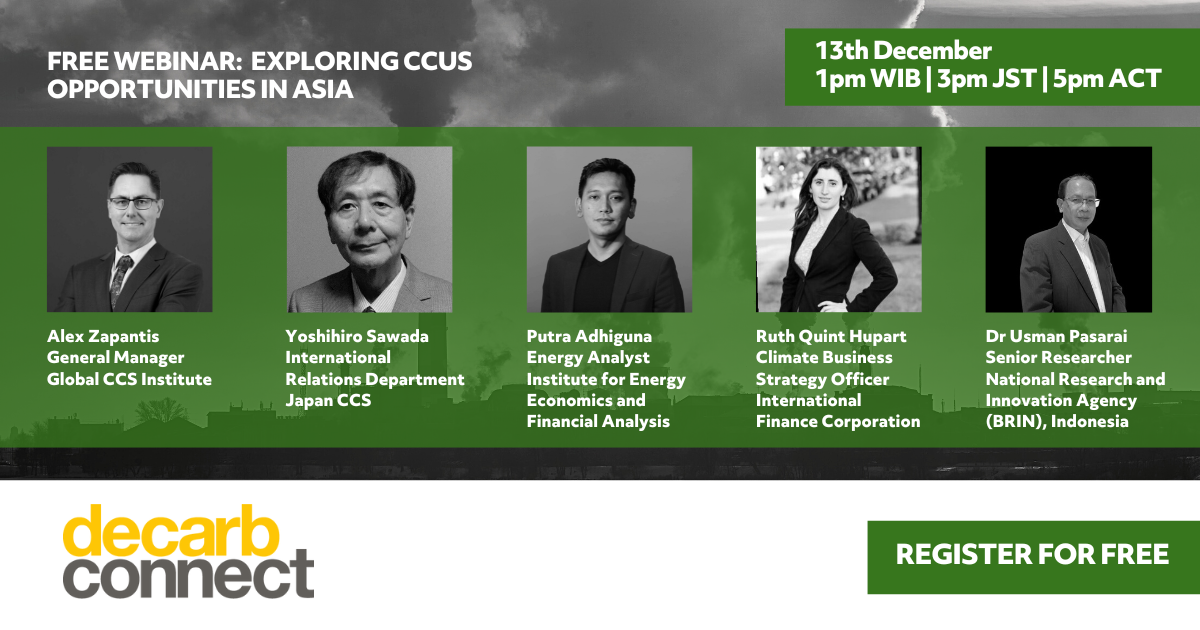
Free Webinar: Exploring CCUS Opportunities in Asia
Tuesday, 13 December 2022 at 1 PM UTC+7 / 3 PM UTC+9/ 5 PM UTC+11 | Stream via Zoom
Hosted by: Decarb Connect
Panel Discussion with Global CCS Institute, Japan CCS, Institute for Energy Economics and Financial Analysis, International Finance Corporation and National Research and Innovation Agency (BRIN), Indonesia

Japan CCS Forum 2022 - Hybrid Forum
Date/ Time: Thursday, 1 December, 2022
Main Forum: 10:00 - 17: 00 JST
Networking Reception at 17:30 - 19:00 JST
Hosted by: Global CSS Institute (GCSSI)
Supported by: Japan Coal Frontier Organization (JCOAL), Japan Oil, Gas and Metals National Corporation (JOGMEC)、Research Institute of Innovative Technology for the Earth (RITE) and Japan CCS Co,. Ltd. (JCCS)
Venue: Bel Salle Toranomon, 2F, Sumitomo Fudosan Toranomon Tower, 2-2-1, Toranomon, Minato-ku, Tokyo (maps)
Capacity:
Main Forum: Up to 100 seats (in-person) and 900 online registration
Networking Reception: Up to 40 capacity (in-person)
Language: English and Japanese, Simultaneous interpretation service is provided at the site and though ZOOM Interpretation function for online participants.
Fee:
Main Forum: Free
Networking Reception: 3,000 JPY at the venue
Further information about the event can be found at the following link
The Second Asia CCUS Network Forum - Hybrid Forum
Co-hosted by Economic Research Institute for ASEAN and East Asia (ERIA) as Secretariat of Asia CCUS Network (ACN) and Ministry of Economy, Trade and Industry (METI), Japan
Event Description
After the COP26 held in Glasgow, United Kingdom, last autumn 2021, many Asian countries echoed western countries regarding the need to find pathways to achieving carbon neutrality by 2050 and beyond with international assistance. In trying to find such pathways, attention will need to be paid to the accessibility, availability, and affordability of energy supply to achieve reasonable economic growth continuously up until 2050. Therefore, in the energy transition period towards carbon neutrality beyond 2050, a gradual shift from coal to gas in power generation will be an important policy to reduce emissions. Co-firing of hydrogen and ammonia with gas and coal power plants is another important policy to move towards carbon neutrality together with maximising the share of variable renewable energy and minimising the share of electric storage. Besides, switching to cleaner fuels such as gas, ammonia, and hydrogen, and to clean technologies, an application of CCUS will be the most appropriate clean energy technologies for the Asian region to achieve net zero emissions. Current challenge to apply CCUS technology is due to geopolitical factors that affect international fossil fuel market. The significant increase of fossil fuels’ price will lead to an additional investment on fossil fuel that means its consumption and CO2 emissions will also increase.
The Second Asia CCUS Network Forum aims to report the ACN’s activities in 2021–2202 and the workplan of ACN’s activities/milestones for 2022–2023. The Second Forum invites the CCS + Initiatives to introduce its activities regarding the calculation of carbon credit for CCS businesses.
Agenda
(Japan Standard Time)
09:00 – 09:10 Welcoming and Opening remarks
H.E. Yasutoshi Nishimura, Minister of Economy, Trade, and Industry (METI), Japan (pre-recorded video)
Prof. Hidetoshi Nishimura, President of ERIA (in-person)
Group photo
09:10 – 10:10 Ministerial remarks (pre-recorded video)
Congratulatory remarks by several EAS Energy Ministers
H.E. The Honorable Pehin Datu Lailaraja Major General (Retired) Dato Paduka Seri Haji Awang Halbi bin Haji Mohd Yussof, Minister at the Prime Minister’s Office, Brunei Darussalam
H.E. Suy Sem, Minister of Mines and Energy, Cambodia
H.E. Arifin Tasrif, Minister of Energy and Mineral Resource, Indonesia
H.E. Dr. Daovong Phonekeo, Minister of Energy and Mines, Lao PDR
H.E. Raphael Perpetuo Mercado Lotilla, Secretary of Department of Energy, Philippines
Mr. Kulit Sombatsiri, Permanent Secretary of Energy of Thailand
H.E. Brad Crabtree, Assistant Secretary for Fossil Energy and Carbon Management, Department of Energy, United States
10:10 – 10:50 Keynote Speeches
Mr Alex Zapantis, General Manager of GCCSI (in person)
Dr Koji Yamamoto, Vice President, Oil & Gas Upstream Unit, JOGMEC (in person)
Mr Patrick Bűrgi, Director Innovation, South Pole and Co-Founder of the CCS + Initiative (in person )
10:50 – 11:00 ACN Annual Report 2021–2022
Dr Han Phoumin, Senior Energy Economist, Energy Unit, ERIA and Senior Officer of ACN Secretariat (in person)
11:00 – 11:55 Panel Discussion – ‘CCS Policies in EAS Countries’ – Issues and Challenges on CCS Deployment (in person)
Moderator: Mr Shigeru Kimura, Special Advisor on Energy Affairs, ERIA
Panelists:
Ms Ayaka Jones, International Technical Advisor for Strategic Engagement, Office of Fossil Energy and Carbon Management, Department of Energy (DOE), United States (in person)
Mr Saeki Norihiko, Director of CCUS Policy, Agency for Natural Resources and Energy (ANRE), METI, Japan (in person)
Ms Jocelyn Taylor, Manager, International CCUS Policy, Department of Climate Change, Energy, the Environment and Water (DCCEEW), Australia (in person)
Dr. Ir. Muhammad Wafid Agung Novianto, M.Sc., Senior Advisor for Environment and Spatial Planning, Ministry of Energy and Mineral Resources (MEMR), Indonesia (in person)
Mr. Zaharin Zulkifli, Deputy Director, Energy Data and Research Unit, Strategic Planning and Communication Department, Energy Commission, Malaysia(in person)
Mr Jesus T. Tamang, Former Director, Energy Policy and Planning Bureau (EPPB), Department of Energy (DOE), Expert Consultant/Associate, Energy Transitions Partnership Support in the Philippines, Aquatera Ltd., Philippines (in person)
11:55 – 12:00 Closing Remarks
Mr Sadamitsu Yuki, Director General, Natural Resources and Fuel Department, ANRE, METI, Japan (in person)
Mr Koji Hachiyama, Chief Operating Officer, ERIA (in person)
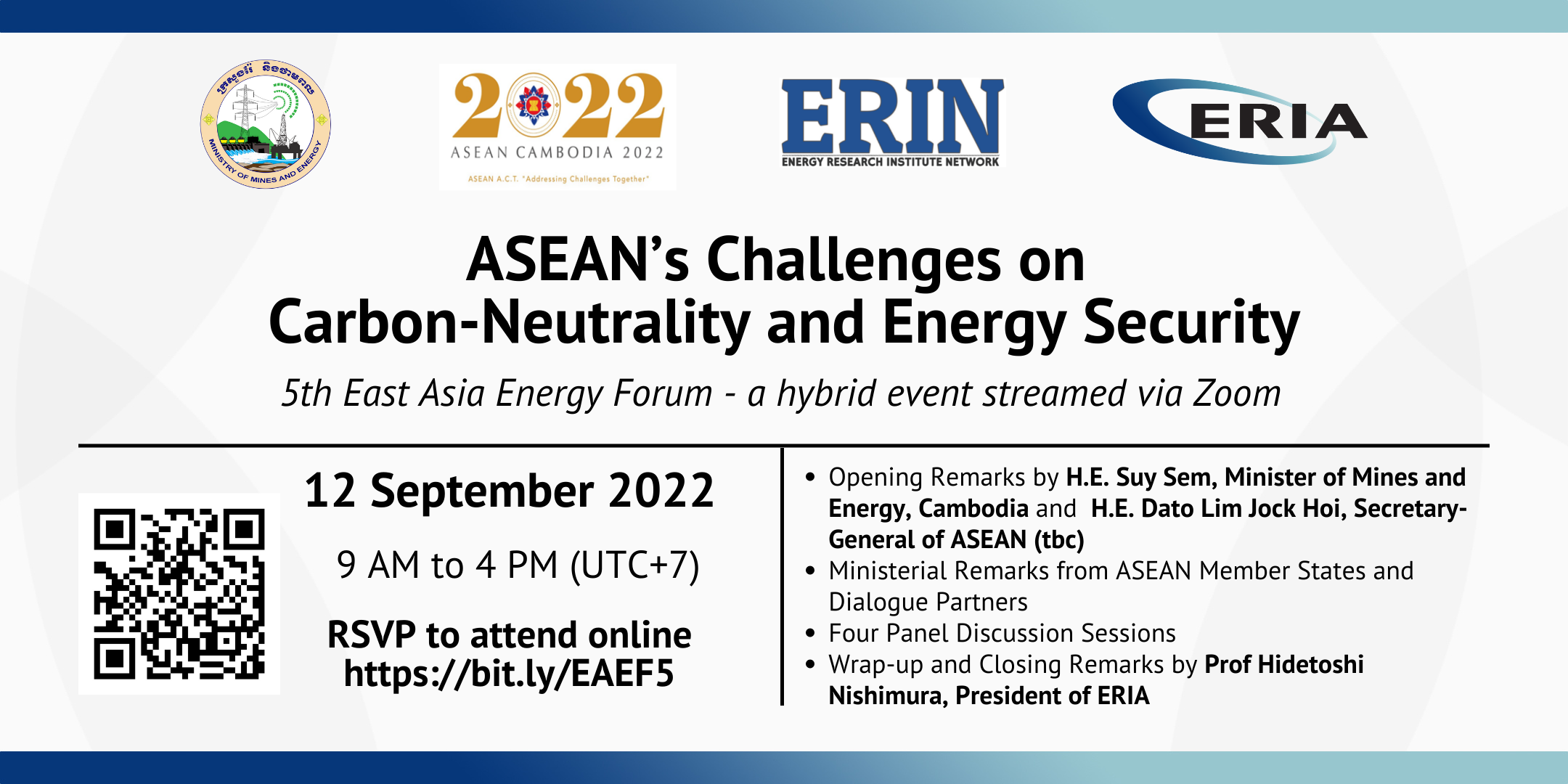
The Fifth East Asia Energy Forum ‘ASEAN’s Challenges on Carbon-Neutrality and Energy Security’
Necessity of carbon neutrality was highlighted at COP26, and many developing countries announced their carbon neutral targets by 2050 with international supports, making carbon neutrality is the priority actions. The urgency of carbon neutral-pathways is key priority for both developed and developing countries. The COP 26 called for deep decarbonization before the turn of 21st century, limiting the global temperature rise to well below 2-degree Celsius, and preferably to 1.5 degree Celsius compared to pre-industrial level. Any delayed action could risk triggering impacts of climate change and so catastrophic our world will become unrecognizable. In this regard, the race to carbon neutrality will require climate ambitious actions including the introduction of suite of policy changes and the need to examining all the possibility of low carbon emissions technologies and the renewables. The COP26 has brought approaches of using multiple pathways to carbon-neutrality that could help countries with large dependency on fossil fuels to make a more meaning full of, “just energy transition,” to protect social well-beings through energy affordability and security, while at the same time, protecting the global warming simultaneously.
The Russia-Ukraine war has brought an imbalance of demand-supply of fossil fuel in the world. The immediate reduction of oil supply due to the collective efforts of Western-led sanctions on Russian, have made oil market becomes vulnerable; thus, it put pressure on global fossil fuel supply security, as fossil fuels will be needed at least for next decade. The oil market’s response to the shock, is the increase of overall energy cost around the world as oil is a global commodity and traded globally. The implication of the supply shortage has a deep effect on energy security for countries around the world. These high energy costs could distract each country’s efforts towards long-term decarbonization, with the short-term agenda dominated by domestic energy security in which they are largely dependent on fossil fuels such as coal, oil, and gas.
The world faces univalent challenges: Carbon neutral and supply security of fossil fuels. This means that human will need to reverse the course of our fossil fuel dependency in which we have rely on these fuels to modernize the human wellbeing and economic growth. This reliance and overuse of the fossil fuels have reached a critical limit where the continuous burning of fossil fuels have caused climate change and any delayed action could risk the future climate stability and so catastrophic our world.
Thus, the 5th East Asia Energy Forum gathers many big-minded people including key energy policymakers, public and private entities, financial institutions and research institutes working in the frontier of carbon-neutral pathways to share their thoughts, policy developments, and innovative technologies: renewables, suite of low carbon technologies.
This hybrid workshop is organised by Economic Research Institute for ASEAN and East Asia (ERIA), Energy Research Institute Network (ERIN), and Ministry of Mines and Energy (MME) Cambodia collaboration with ASEAN Energy Business Forum (AEBF)
Event Details
Date: Monday, 12 September 2022
Time: 9:00AM - 4:00PM (UTC/GMT+7)
Venue: Sokha Hotel, Phnom Pehn, Cambodia
Agenda
8:30 AM – 9:00 AM Registration
9:00 AM – 9:20 AM Welcoming and Opening Remarks
H.E. Suy Sem, Minister of Mines and Energy, Cambodia (in-person)
H.E. Dato Lim Jock Hoi, Secretary General of ASEAN (pre-recorded video)
Exchange of Tokens of Appreciation between the President of ERIA to the Minister of Mines and Energy, Cambodia
9:20 AM – 10:05 AM Keynote Speeches (Pre-recorded videos)
Honourable Pehin Datu Lailaraja Major General (Retired) Dato Paduka Seri Haji Awang Halbi bin Haji Mohd Yussof, Minister at the Prime Minister’s Office, Brunei Darussalam
H.E. Arifin Tasrif, Minister of Energy and Mineral Resource, Indonesia (live via zoom)
H.E. Nakatani Shinichi, State Minister of Economy, Trade, and Industry, Japan
H.E. Daovong Phonekeo, Minister of Ministry of Energy and Mines, Lao PDR (TBC)
H.E U Myo Myint Oo, Union Minister, Ministry of Energy, Myanmar
H.E. Raphael Perpetuo Mercado Lotilla, Secretary of Department of Energy, Philippines
H.E. Gan Kim Yong, Minister of Trade & Industry, Singapore (TBC)
Dr Pisut Painmanakul Secretary to Ministry of Energy on behalf of H.E. Supattanapong Punmeechaow, Deputy Prime Minister and Minister of Energy, Thailand
H.E. Trần Tuấn Anh, Minister of Industry and Trade, Vietnam (TBC)
H.E. Brad Crabtree, Assistant Secretary for Fossil Energy and Carbon Management, Department of Energy, United States
10:05 AM – 10:20 AM Scene-Setting Presentation: “Opportunities and Challenges for Carbon-neural Pathways”
Prof Jun Arima, Senior Policy Fellow, Economic Research Institute for ASEAN and East Asia (ERIA)
10:20 AM – 10:30 AM Coffee break
10:30 AM – 11:30 AM Panel Session 1: Implication of Ukraine War to Regional Energy Situation
Moderator:
Mr Shigeru Kimura, Special Adviser to the President on Energy Affairs, ERIA
Panelists:
Dr Nuki Agya Utama, Executive Director of ASEAN Centre for Energy (ACE)
Ms. Toril Bosoni, Head of Oil Industry and Market Division, IEA: to share us mid. and long-term global oil market
Mr. Hiroshi Hashimoto, Head of Gas Group, Institute of Energy Economics, Japan
Mr Yuichiro Torikata, Senior Energy Analytic Product and Mr Matthew Boyle, Lead Analyst of Thermal Fuels, KPLER KPLER
11:30 AM – 12:30 PM Panel Session 2: How to Secure Affordable Energy Transition Pathways?
Moderator:
Dr Yanfei Li, Research Fellow, ERIA
Panelists:
Dr Poonpat Leesombatpiboon, Executive Director of International Affairs Division, Ministry of Energy, Thailand
Dr Saleh Abdurrahman, Member of Committee for Downstream Oil and Gas Regulatory Body – Former Senior Advisor for Environment and Spatial Planning, Ministry of Energy and Mineral Resources (MEMR), Indonesia
H.E. Victor Jona, Under Secretary of State, Ministry of Mines and Energy (MME), Cambodia
12:30 PM – 1:30 PM Lunch break
1:30 PM – 2:40 PM Panel Session 3: Accelerating Energy Transitions: Electric Vehicles & Battery Storage
Moderator:
Dr Alloysius Joko Purwanto, Energy Economist, ERIA
Panelists:
Mr. Indra Chandra Setiawan, S.T., M.T, Project Deputy General Manager Toyota Daihatsu Engineering & Manufacturing
Ms Minta Poowatanavong, Engineer, Professional Level, Division of Energy Efficiency Promotion, Department of Alternative Energy Development and Efficiency (DEDE), Ministry of Energy, Thailand
Mr Shiv Aggarwal, Sales & BD Leader APAC - GE Renewable Energy
2:40 PM – 3:50 PM Panel Session 4: How to Secure Investment for Carbon-Neutrality and Energy Security?
Moderator:
Dr Han Phoumin, Senior Energy Economist, ERIA
Panellists:
Prof Jun Arima, Senior Policy Fellow, Economic Research Institute for ASEAN and East Asia (ERIA)
Ms Cecilia Tam, Team Leader, Clean Energy Finance and Investment Mobilisation, OECD.
Mr Masayuki Fujiki, Managing Director, Head of Structured Finance, Solution Products Division, MUFG Bank, Ltd.
Mr Takeshi Soda, Director for Petroleum and Natural Gas Division, Natural Resources and Fuel Department, Agency for Natural Resources and Energy (ANRE) / Director for International Carbon Neutral Policy Office, Minister’s Secretariat, Ministry of Economy, Trade, and Industry (METI), Japan
3:50 PM – 4:00 PM Wrap-up and Closing Remark
Prof Hidetoshi Nishimura, President of ERIA
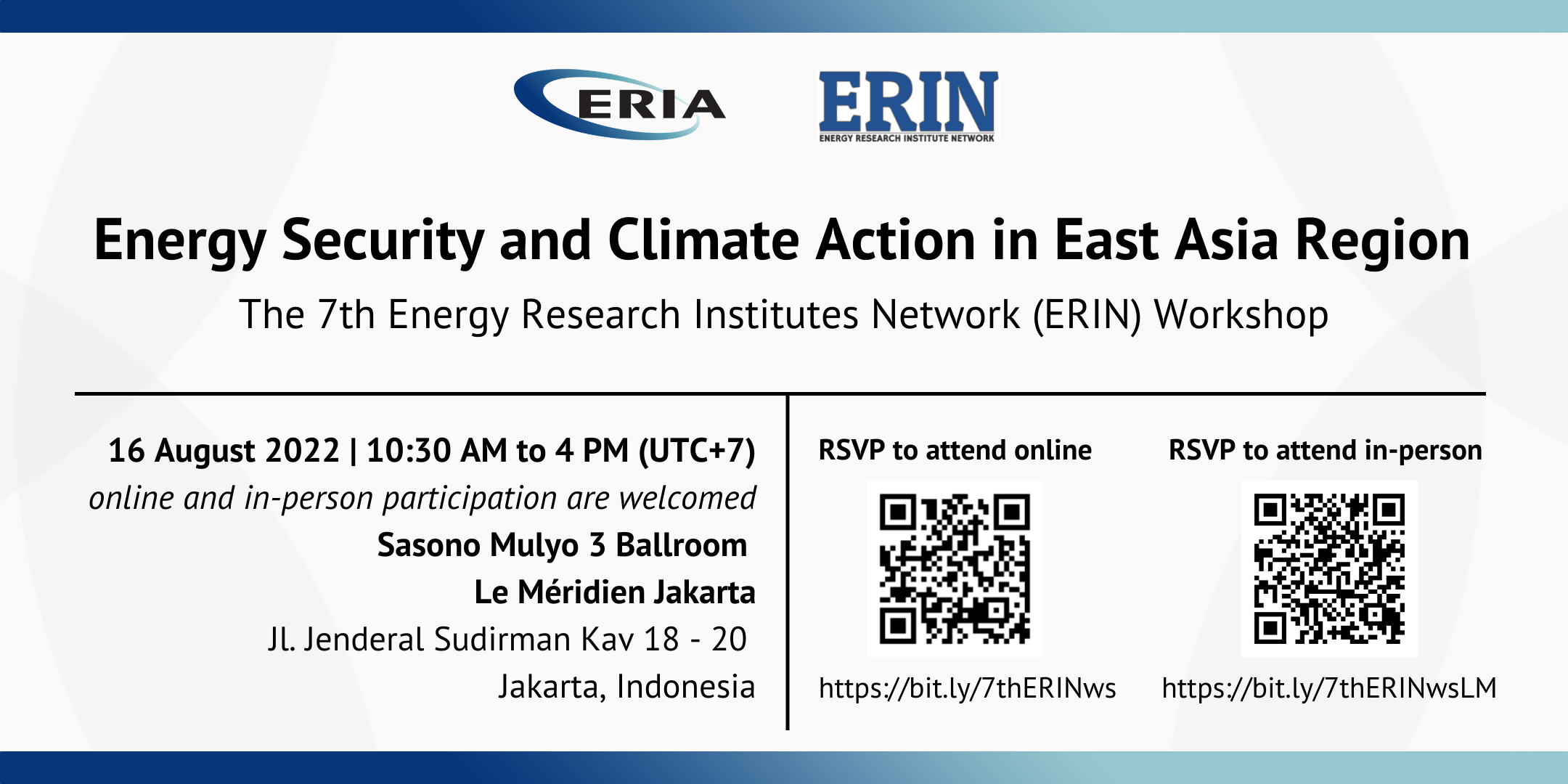
The 7th Energy Research Institute Network (ERIN) Workshop: Energy Security and Climate Action in East Asia Region
Energy landscape has significantly changed since the conflict between Russia and Ukraine. Prior to the conflict, climate action was at the center of energy debate in which discussions centered on how to increase renewable energy and, conversely, reduce the use of fossil fuels. However, with energy prices further escalating due to the conflict and growing concerns about physical oil and natural gas supply shortages, interest in energy security has rapidly increased. Investments in fossil fuels are essential to resolving the ongoing energy security crisis, and it is obviously contradicted with long-term climate action. Thus, the world faces the difficult challenge of how to deal with strengthening fossil-based energy security while at the same time taking step to combat climate change. Addressing this issue is essential for the economic growth of Asian countries. In this workshop, we will invite experts from Asia and other regions to discuss this issue from multiple perspectives.
Event Details
Date: Tuesday, 16 August 2022
Time: 10 AM - 4 PM (Jakarta time, UTC+7)
Hybrid event, open for online and in-person participation
Offline seats are very limited, register soon to secure your seat
Venue: Sasono Mulyo 3 Ballroom, Le Méridien Jakarta
RSVP
Agenda
10:00 AM - 10:30 AM Registration
10:30 AM – 10:45 AM Opening Session
Opening Remark
Prof Tutuka Ariadji, Director General, Directorate General of Oil and Gas, Minister of Energy and Mineral Resources (MEMR), IndonesiA
Prof Hidetoshi Nishimura, President of ERIA
Welcome Remark
Dr Siti Indati binti Mustapa, Director of Institute of Energy Policy and Research, Universiti Tenaga Nasional (UNITEN), Malaysia [Co-Chairperson of ERIN]
10:45 AM – 11:15 AM Special Keynote Speeches:
Ukraine Crisis and Indispensable Cooperation in Asia
Prof Masakazu Toyoda, Senior Advisor (Former Chairman and CEO), The Institute of Energy Economics, Japan (IEEJ), Japan
Report of G20 Indonesian Presidency on Energy Transition Working Group
Mr Yudo Dwinanda Priaadi, Chairman of the G20 Energy Transition Working Group - Expert Staff to the Minister of Energy and Mineral Resources, Indonesia (TBC)
PHOTO SESSION
11:15 AM – 12:15 PM Session 1: Implication of Russia-Ukraine Conflict on Short- to Mid-Term Energy Security
Moderated by:
Prof Basil M. H. Sharp, Professor, Chair in Energy Economics, Department of Economics, Faculty of Business and Economics, The University of Auckland (UoA)
Panelists:
Present Situation of Impact and Trends in Policies
Mr Keisuke Sadamori, Director, Energy Markets and Security, International Energy Agency (IEA)
Uneasiness of Importing Countries, Pursuing for Low Prices, and LNG Import has challenged
Mr Michael O. Sinocruz, OIC-Director, Energy Policy and Planning Bureau, Department of Energy (DOE), Philippines
Exploring Alternatives to Russian Crude Oil and LNG
Dr Woongtae Chung, Director of International Cooperation Research Center, Korea Energy Economics Institute (KEEI), Republic of Korea (TBC)
Potential for increasing Export of LNG and Crude Oil
Mr Lucian Pugliaresi, President, Energy Policy Research Foundation (EPRINC), United States
Key questions
Impact of the Russia-Ukraine conflicts on the current and projected energy situation.
How will the Russia-Ukraine conflict influence energy security concerns in the EAS region? Are there any changes in energy strategies responding to the conflict? What are the pragmatic short- to mid-term strategies for EAS countries?
12:15 PM – 1:15 PM Lunch Break
1:15 PM – 2:00 PM Session 2: Aligning Climate Action with Energy Security in EAS Region
Moderated by:
Dr Asclepias Rachmi Soerjono Indriyanto, Chairperson of Executive Board, Indonesian Institute for Energy Economics (IIEE), Indonesia [ERIN Member]
Panelists:
Low Carbonization of Coal-fired Power Plants, and Need for Low-cost Gas
Mr A. K. Saxena, Senior Fellow and Senior Director of Electricity and Fuels Division, The Energy and Resources Institute (TERI), India (Alternate ERIN Member)
Balanced Energy Policies including EE&C
Department of Alternative Energy development (DEDE), Ministry of Energy (MOEN), Thailand (TBC)
Hydrogen Export and Supply Chain
Ms Rebecca Thomson, Hydrogen Strategy Team, Department of Industry, Science, Energy and Resources (DISER), Australia
Decarbonization Path based on Actual Situation of ASEAN Countries, and Results of AETI
Dr Han Phoumin, Senior Energy Economist, Energy Unit, Research Department, ERIA
Key questions
Integrated strategies for energy security and climate protection.
What are the accessible and affordable options for EAS countries both in terms of energy security and GHG mitigation? What kind of investment will be required along the time horizon?
2:15 PM – 2:45 PM Break
2:45 PM – 3:45 PM Session 3: Necessary Policies and Initiatives for Energy Security and Climate Action in EAS Region
Moderated by:
Dr Siti Indati binti Mustapa, Director of Institute of Energy Policy and Research, Universiti Tenaga Nasional (UNITEN), Malaysia [Co-Chairperson of ERIN]
Background and Objectives of Session 3
Mr Tatsuya Terazawa, Chairman and CEO, The Institute of Energy Economics, Japan (IEEJ), Japan [ERIN Member]
Panelists:
Needs of Asian Developing Countries, and Necessity of Investment to Fossil Energy
Dr Djoko Siswanto, Secretary General, National Energy Council (NEC), Indonesia
Needs of Asian Developing Countries, and Necessity of Investment to Fossil Energy
H.E. Mr Victor Jona, Under Secretary of State, Ministry of Mines and Energy (MME), Cambodia [ERIN Member]
Role of Financial Institution
Mr Florian Kitt, Senior Energy Specialist, Southeast Asia Department, Asia Development Bank (ADB)
Key questions
Gap between the demand for hasty decarbonization and the reality in Asia. What gaps exist? Is investment in fossil energy unnecessary? What policies or initiatives are needed for Asia to address both energy security and GHG mitigation, including in investment and financing?
3:45 PM- 4:00 PM Closing Remarks
Mr Koji Hachiyama, Chief Operating Officer, Director General of Administration, Personnel, & Outreach Departments, ERIA
Japan Energy Summit 2022: Japan's Roadmap to Carbon Neutrality
The Japan Energy Summit is taking place next week from 2 - 4 August 2022 at the Grand Hyatt in Tokyo. The Summit will welcome Japanese senior-level buyers, government representatives and international suppliers to discuss the evolving Japanese energy sector and its leading position in decarbonising global gas, LNG, and hydrogen markets.
As a valued colleague of the Economic Research Institute for ASEAN and East Asia (ERIA) you receive a 10% discount on all delegate passes. This is your chance to gain direct access to the key Japanese buyers and international sellers in order to forge new business relationships and learn from the leaders who have begun delivering on decarbonisation commitments.
The Summit has continued support from the Ministry of Economy, Trade and Industry (METI), JERA Co. Inc., Tokyo Gas, Institute of Energy Economics, Japan (IEEJ) and New Energy and Industrial Technology Development Organization (NEDO).
‘Emerging Economies towards Net Zero Emission: Challenges and Opportunities on Technology Innovation and Financing’
Virtual Workshop as a Side Event under Task Force3 (TF3) the Think Tank20 (T20).
Hosted by Institute of Economic and Social Research Faculty of Economics and Business, University of Indonesia (LPEM-FEB UI) and Economic Research Institute for ASEAN and East Asia (ERIA)
The 2022 G20 Indonesia Presidency’s Energy Transition pillar of ‘Global cleaner energy systems and just transitions’ aims at achieving a global deal to accelerate energy transition. G20 Indonesia Presidency has opted, therefore, its pathway to achieve carbon neutrality target by accelerating the just process of reducing energy-related greenhouse gas emissions through various forms of decarbonization. Such decarbonisation means an additional investment is necessary. Nevertheless, the question remains how to finance energy transition, especially in the context of reaching carbon neutrality pledges that vary across G20 countries?
Apart from traditional financial and policy instruments, countries need also to fully employ new and innovative schemes to support clean energy financing and markets. This virtual workshop aims to explore workable financing mechanisms in each technology cluster (including renewable energy resources and its carriers, CCS/CCUS, and Direct Air Capture technologies) that play important roles in the energy transition with the emphasise in the ASEAN countries.
Event Details
Date: Wednesday, July 20, 2022
Time: 14:00 – 16:15 WIB (UTC+7 - Hanoi, Jakarta, Bangkok Time)
RSVP: https://bit.ly/3OLQEFb
Agenda
Opening Remarks by Moekti Handajani Soejachmoen (Kuki), Lead Co-Chair of the T20-Task Force 3: Governing Climate Target, Energy Transition, and environmental Protection
Keynote speech 1: Carbon Neutral Pathway of Indonesia by Dadan Kusdiana, Director General of Energy Efficiency and Renewable Energy Department, MEMR, Indonesia
Keynote Speech 2: Global Low Carbon Energy Transition by Prof Jun Arima, Senior Policy Fellow of ERIA and Co-Chair of TF3
Presentations and Panel Discussion
Moderator: Dr Alin Halimatussadiah, LPEM FEB University of Indonesia
Presentation 1: Energy Technology Perspective (Battery electric storage, Hydrogen/ Ammonia, CCS/CCUS, and Direct Air Capture)
Battery electric storage by Akira Yasugi, P.E. Engineering manager, I&C and Electrical Engineering Team, Power Plant engineering Group, Mitsubishi Heavy Industries, Ltd
Hydrogen/Ammonia by Jitendra Roychoudhury, King Abdullah Petroleum Studies and Research Center (KAPSARC), Riyadh, Saudi Arabia
CCS (Capture) by Dr Takashi Kamijo, Chief Engineer/License Technolgy Director, Decarbonization Business Department, Mitsubishi Heavy Industries Engineering, Ltd.
CCS (Storage) by Dr Ziqiu Xue, Research Institute for Innovative Technologies for the Earth (RITE)
Direct Air Capture by Ryohei Numaguchi, Ph.D., Researcher, Energy System Research Department, Corporate Technology Division, Kawasaki Heavy Industry, Ltd.
Presentation 2: Energy Financing (Public, Private and Climate Finance Mechanisms)
Private Finance by Yukimi Shimura, Director, Planning & Development Department, Sustainable Business Division, MUFG Bank, Ltd.
Climate Financing Prof Frank Jotzo, Professor, Crawford School of Public Policy; Director, Centre for Climate and Energy Policy.
Carbon Credit by Kikuko Shinchi, Senior Researcher, Climate Change Solution Group, Sustainability Division, Mitsubishi Research Institute, Inc.
Panel Discussion: Dialogue between Energy Technology and Financing Group, with topics:
Role of financing for supporting energy technology development and deployment
Expectations to Governments
Comments from energy technology group
Comments from financing group
Closing Remarks by Toru Furuichi, Director General for Research and Policy Design Administration, ERIA

ASIA CLEAN ENERGY FORUM 2022: Financing Carbon Capture, Utilisation and Storage
Background
Deploying carbon capture is a must to reach net-zero targets, across several industries and sector. This requires hundreds of large-scale projects to be established over the next 10-15 years. Due to often lacking business models, financing large-scale projects is challenging. This official side-event of the 2022 Asia Clean Energy Forum brings together governments, the finance sector and expert analysts to discuss how CCUS financing and investment can be accelerated.
Objectives
To explore what role different types of financial market players can play in deploying CCUS;
To present the role of government policies in the wider Asia region, to help establish business cases;
To discuss how governments and the finance sector can collaborate in the Asia region.
Event Agenda (all times Manila time, PHST)
20:00 Opening and welcome | CEM CCUS Initiative
20:05 Market potential for CCUS in Asia | Speaker TBC
20:20 Roundtable 1: Roles of finance sector players in scaling up CCUS in Asia
- Mari Onodera, Managing Director, MUFG Bank Ltd
- Lionel Martinez, Vice President, ING Bank
- Priyantha Wijayatunga, Energy Sector Chief, Asian Development Bank
- Ian Havercroft, Principal Consultant, Global CCS Institute
- Won-Dong Cho, Adviser, Karbon Korea
- Moderator: Tom Morley, Dept. for Business, Energy and Industrial Strategy, UK
20:50 Roundtable 2: Governments as drivers for CCUS in Asia
- Saleh Abdurrahman, Member of Committee, BPH Migas, Indonesia
- Takeshi Soda, Director, METI, Japan
- Fourth panelist TBC
- Moderator: Jocelyn Taylor, Department of Industry, Science, Energy and Resources, AUS
21:20 Closing remarks
21:30 Close of event
Further information, please visit the website: CEMSideEvent2022
Carbon Neutrality Roadmap of ASEAN Countries
IEEJ will present their analysis on the roadmap for ASEAN countries’ transition to carbon neutrality. Recently, with the COP26 as a trigger, the decarbonisation movement is spreading not only across developed countries but also to many other countries including the ASEAN region, and some ASEAN countries have declared carbon neutrality by the mid of this century. Such highly ambitious GHG emissions reductions require a fundamental transformation of energy systems. At the same time, the energy transition cannot be accomplished with a uniform measure. In particular, the ASEAN countries are still highly dependent on fossil fuels and experiencing high economic and energy demand growth. Given these circumstances, the study aims to quantitatively describe the pathway of energy transition necessary to realise carbon neutrality in ASEAN countries by using a cost-optimal technology selection model. The IEEJ conducted this study together with the Economic Research Institute for ASEAN and East Asia (ERIA), and fully discussed the outcomes with each of the ASEAN countries to reflect their views and realities.
The IEA is also expected to release its ASEAN Energy Outlook soon. It is our privilege that Tim Gould, Chief Energy Economist, the IEA will participate in this webinar as a commentator in the panel discussion.
Speakers
Toshiyuki Sakamoto, Board Member, Director, IEEJ
Soichi Morimoto, Senior Researcher, Climate Change Group, IEEJ
Yuji Mizuno, Chief Researcher, CCUS Group, IEEJ
Guest Commentator
Tim Gould, Chief Energy Economist, IEA
Inquiries
If you have any inquiries, please contact ieej-mail@tky.ieej.or.jp
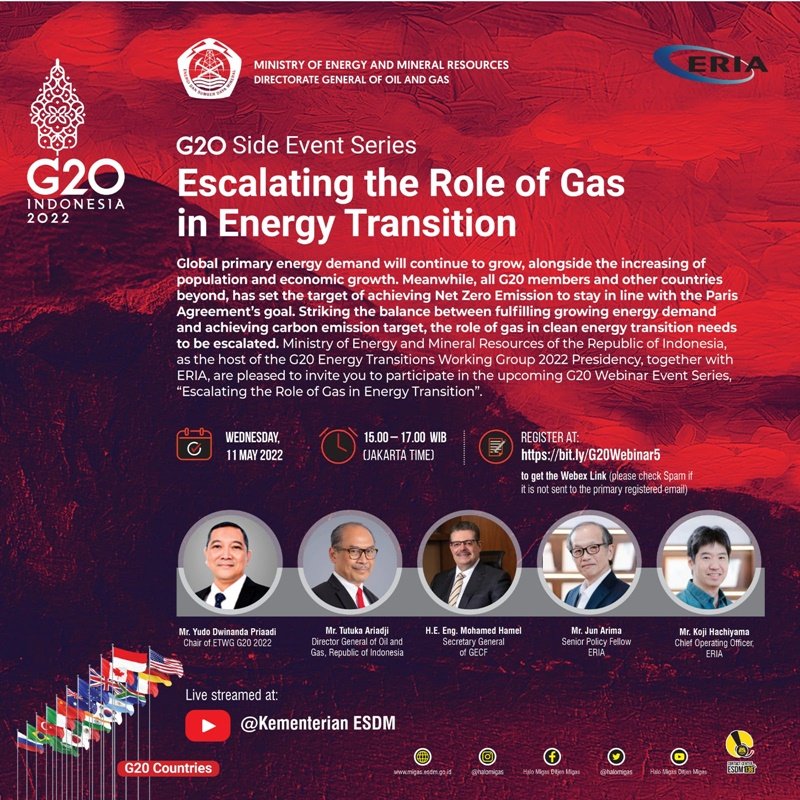
‘Escalating the Role of Gas in Energy Transition’- Side Event under ETWG G20 2022
Virtual Workshop as a Side Event under ETWG G20 2022.
Hosted by Ministry of Energy, Mineral Resources, Indonesia (MEMR) and Economic Research Institute for ASEAN and East Asia (ERIA)
As developing countries aim to achieve similar economic standards of developed countries, their electricity demand has been significantly increasing. For example, between 2000 and 2017, final electricity demand in the East Asia Summit (EAS) least-developed to upper-middle income countries has increased by an average rate of 8.4 percent per year whilst that of the EAS high-income countries had increased by an average rate of merely 0.7 percent per year (Han and Kimura, 2021). Most of these countries have been depending on thermal power generation that consumes fossil fuels because of its economic feasibility and high-capacity factor.
However, to achieve the low carbon energy transition, another available options for developing countries is to shift from coal to gas power generation. Despite higher gas prices relative to coal, this shift should take place in parallel with the increasing use of renewable energies such as solar photovoltaic (PV) systems. Thus, under the low carbon energy transition period from 2020 to 2030 or 2040 facing uncertainty of volatile international energy markets both oil and gas due to the war in Ukraine caused by Russia, the role of gas must be escalated to achieve carbon dioxide (CO2) reduction while maintaining the affordability of electricity prices.
Confirming the ‘Principles of Energy Collaboration’ endorsed by G20 leaders at the 2014 G20 summit in Brisbane, the energy ministers meeting in Argentina in 2018 highlighted the importance of investment in infrastructure and the role of digitalization and flexibility in the power sector, including the role of natural gas in the G20 countries.
The 2022 G20 Indonesia Presidency Energy Transition pillar includes the main topic of ‘Global Cleaner Energy Systems and Just Transitions’ that aims at ‘achieving global deal to accelerate energy transition’.
This workshop will provide new insights into how to escalate the role of natural gas as part of the just process of low carbon energy transition in developing countries which shall foster the G20 energy transition agenda paying attention to uncertainty on gas market.
This workshop also aims to support G20 Members to understand the different pathways to escalate the use of natural gas in meeting final energy demand in developing countries in the low carbon energy transition context, while pursuing and strengthening the implementation of the previous 2021 G20 Italian action plan that includes ensuring access to clean energy for all, especially in developing countries.
Event Details
Date: Wednesday, 11 May 2022
Time: 3 PM- 5 PM (Jakarta time, UTC+7))
The 1st Asia Green Growth Partnership Ministerial Meeting (AGGPM) Public-Private Forum
The Ministry of Economy, Trade and Industry (METI) will hold the first ‘Asia Green Growth Partnership Ministerial Meeting (AGGPM) Public-Private Forum’.
This forum is an industry-government-academia collaboration to accelerate diverse and realistic energy transitions in Asia, confirmed at the 1st Asia Green Growth Partnership Ministerial Meeting (AGGPM) held on 4 October 2021.
The Forum will focus on “innovation” and “finance” to support energy transitions, and feature a variety of sessions to present concrete projects and efforts by industry, government and academia in Japan and Asia.
The forum will open with keynote speeches by ministers from Asian countries, followed by a special ceremony session that include:
An MOU signing ceremony among private companies on projects and initiatives contributing to energy transitions in Asia,
The presentation of interim report on the discussion of promoting Transition Finance in Asia by the ATF Study Group led by private financial institutions,
The presentation of final report on a roadmap analysis for the realization of carbon neutrality in ASEAN by the Economic Research Institute for ASEAN and East Asia (ERIA) and the Institute of Energy Economics, Japan (IEEJ).
Additionally, the Forum will hold panel discussion sessions under the themes of 1) the mobilization of finance and 2) the promotion of innovation that are essential for promoting energy transitions in Asia.
Prominent figures from international organizations and private companies are confirmed to join the sessions to have lively discussions on the future pathways of energy transitions in line with actual situations in Asia.
Date and time: 25 April 2022, 3:00 pm - 6:30 pm (JST)
Event: online
For further information, please visit: https://www.aggpm2022.org/
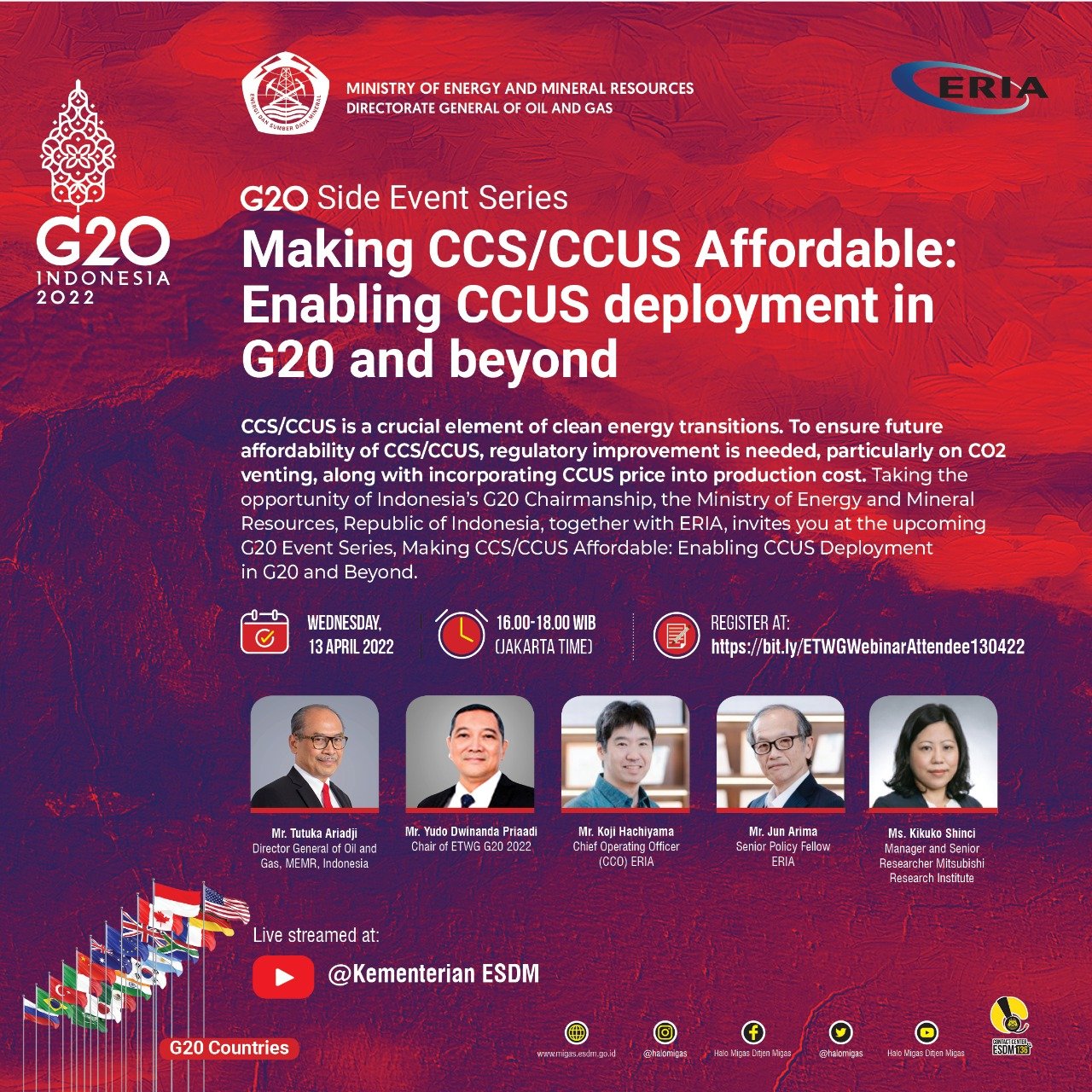
Making CCS/CCUS Affordable: Enabling CCUS Deployment in G20 and Beyond
Taking the opportunity of Indonesia’s G20 Chairmanship, this side event workshop hosted by Asia CCUS Network and the Ministry of Energy and Mineral Resources (MEMR) of the Republic of Indonesia are very pleased to invite all stakeholders to participate in an online workshop on ‘Commercializing CCS/CCUS: Making Technologies Affordable’. The workshop will promote knowledge-sharing on the cost structure and range of expected costs of CCUS, joint project demonstration and policy frameworks for supporting the development and deployment of CCS/CCUS. As part of this workshop, we seek potential collaborators for a joint demonstration project (coal power plant + CCUS) with the participation and support of interested G20 countries.
Conference on "Promotion of CCUS Technologies within the framework of the Green Bridge Partnership Program"
Hosted by: The International Green Technologies and Investment Projects Center (IGTIPC)
Supported by: The Ministry of Ecology, Geology and Natural Resources of the Republic of Kazakhstan
Time: 13:00-onwards Nur-Sultan, Kazakhstan time
Language: English, Russian (Simultaneous interpretation will be provided by the organizers)
System: ZOOM Webinar
For more details on organizer’s event page:
the International Green Technologies and Investment Projects Center (IGTIPC) (English):https://ccus.igtipc.org/en/
The 5th Knowledge Sharing Conference: Australia’s Experience on CCUS
Australia's Experience on CCUS
The Asia CCUS Network was successfully launched on 22-23rd June 2021. Currently 14 countries (all ASEAN member countries, the United States, Australia, India and Japan) and more than 100 international organisations, companies, financial and research institutions are joining the Network. Members share the vision of CCUS development throughout the Asian region, and the Asia CCUS Network aims to contribute through the collaboration and cooperation on development and deployment of CCUS through organizing knowledge sharing conference regarding CCUS.
The Australian Government is focused on accelerating large-scale deployment of CCUS under its Long-Term Emissions Reduction Plan through a range of measures and initiatives such as the National CCUS Technology Emissions Abatement Strategy (NCAS), the CCUS Development Fund and CCUS Hubs and Technologies programs. Underpinning these efforts is the technical and research work undertaken by key scientific and research organisations such as the CSIRO and Geoscience Australia. Australia is interested in working with like-minded countries on ways to deploy CCUS and values forums such as the Asia CCUS Network to share experiences and expertise.
This conference aims to share the experience from Australia on CCUS policy development as well as experiences from CCUS Development Fund grantees. There will be three guest speakers from Australia. Corporate Carbon who has received funding to support the development of direct air capture technology couple with solar PV that can produce a clean fuel with carbon neutrality.
The second speaker will be from Mineral Carbonation International who will talk about their world-first mineral carbonation mobile demonstration plant. And the final speaker is from Carbon Transport and Storage, a Glencore company, who’s project aims to demonstrate the technical viability, integration and safe operation of CCS in the Surat Basin in Queensland, Australia.
Agenda
3 PM - 3:10 PM Opening Remarks
Taizo Hara, Director General of Research and Policy Design Administration of ERIA (3-5 minutes)
Dan Quinn, General Manager, Resource Strategy, Onshore Resources Division, Department of Industry, Science, Energy and Resources, Australia (3-5 minutes)
3: 10 PM - 3:45 PM Introduction of Australian CCUS Projects: Direct Air Capture, Carbon Recycling and CO2 Storage
Moderator: Dr Han Phoumin, ERIA
Julian Turecek, Executive Director/ Project Director, Direct Air Capture (DAC) Corporate Carbon (10 minutes): Solar powered direct air capture
Sophia Hamblin Wang, Chief Operating Officer, Mineral Carbonation International (MCI) (10 minutes): A scalable carbon platform technology that safely captures and converts industrial CO2 emissions into solid bulk materials used in new low-carbon products for construction, industrial and consumer markets and enabling the circular economy.
Darren Greer, General Manager Carbon Transport and Storage, a Glencore Company (CTSCo) (10 minutes): Technical viability, integration and safe operation of CCS in the Surat Basin in Queensland, Australia
3:45 PM - 4 PM Commentary Session
Souksakhone Philavanh, Director of Energy Law Division, Department of Law, Ministry of Energy and Mines, Government of the Lao PDR
4 PM - 4:25 PM Open discussion Session
4:25 PM - 4:30 PM Closing Remarks
Shigeru Kimura, Special Advisor to the President on Energy Affairs, ERIA
CCUS Model Case Study Workshop organized by Mitsubishi Research Institute Inc., Japan
Cost Structure of CCUS and the Legal Framework
Background and Objectives
At the 1st Asia CCUS Network Forum held in June 2021, it was concluded that CCUS and Carbon Recycling are crucial technologies for the East Asia Summit (EAS) region to achieve carbon neutrality in the future amidst the expected increase of fossil fuel consumption in the region. It was also discussed by the stakeholders that participated in the Forum, that to bring more CCUS projects to the commercialisation stage, issues, such as the lack of an adequate legal framework to address liability and a project pipeline through pilot projects need to be resolved. Moreover, it is expected that to accelerate the deployment of CCUS in the EAS region, there is a need to bridge the gap and to implement knowledge and experience sharing amongst the ASEAN and Asia region.
Building upon the outcome of previous discussions as described above, this workshop hosted by ERIA and METI aims to serve as an opportunity to share knowledge about the cost structure of CCUS projects through model case study and discuss policies and measures that may contribute to developing enabling environment of the business case of CCUS.
The goals of the workshop are as follows:
Promote the knowledge share on the cost structure and range of expected costs of CCUS.
Exchange ideas of policies and measures that may be beneficial to bring down costs.
Discuss possibilities of regional response for policy formulation.
Programme (As of 13 January 2022)
(Jakarta Standard Time UTC+7)
9:00 - 9:05 Welcome address
Mr Shigeru Kimura, Special Advisor to the President on Energy Affairs, ERIA
9:05 - 10:00 Outcome of model case study, cost analysis and policy proposal
Mr Ulysses Coulmas, Researcher, Mitsubishi Research Institute (MRI)
Ms Ayami Saimura, Researcher, Mitsubishi Research Institute (MRI)
10:00 - 10:50 Panel Discussion
Moderated by Kikuko Shinchi, Senior Researcher, MRI
Topics will include the following:
CAPEX/OPEX reduction potential
Policy/Legal requirement
Regional cooperation approach
Further project development needs towards commercialisation
Findings from model case exercise
Panelists:
(1) Mr Yoshihiro Sawada, Corporate Adviser, General Manager of International Affairs Department, Japan CCS Co., Ltd.
(2) Dr Mohammad Rachmat Sule, Lecturer, Faculty of Mining and Petroleum Engineering, Institut Teknologi Bandung (ITB)
(3) Mr Jinmiao Xu, Energy Specialist, Energy Sector Group, Sustainable Development and Climate Change Department, Asian Development Bank (ADB)
(4) Ms Yukimi Shimura, Director, Planning & Development Department, Sustainable Business Division, MUFG Bank, Ltd.
(5) Mr Ulysses Coulmas, Researcher, Mitsubishi Research Institute
10:50 - 11:00 Closing Remarks
Dr Han Phoumin, Senior Energy Economist, ERIA
4th Asia CCUS Network Knowledge Sharing Conference
The Clean Energy Ministerial (CEM) CCUS Initiative plays a critical role to support the adoption and deployment of CCUS around the world. The Asia CCUS Network is partnering with the CEM CCUS Initiative and the European Commission in co-hosting this knowledge sharing conference on the topic of “Learning from failures – building on success: EU experience on CCUS”
Japan-Asia CCUS Forum 2021
Hosted by: Global CCS Institute (GCCSI) and Japan CCS Co. Ltd.(JCCS)
Co-hosted by: New Energy and Industrial Technology Development Organization (NEDO)
Supported by:Ministry of Economy, Trade and Industries (METI)
Language: Japanese and English (Simultaneous interpretation service will be provided)
System: ZOOM Webinar
Capacity: 1,500 registrants
For more details on organizer’s event page:
Global CCS Institute (English):https://jp.globalccsinstitute.com/japan-asia-ccus-forum-2021_en/
Japan CCS Co,. Ltd.: (English): https://www.japanccs.com/en/news/20210921/
Global CCS Institute (Japanese): https://jp.globalccsinstitute.com/japan-asia-ccus-2021%E2%80%97jp/
Japan CCS Co,. Ltd.: (Japanese): https://www.japanccs.com/news/20210921/
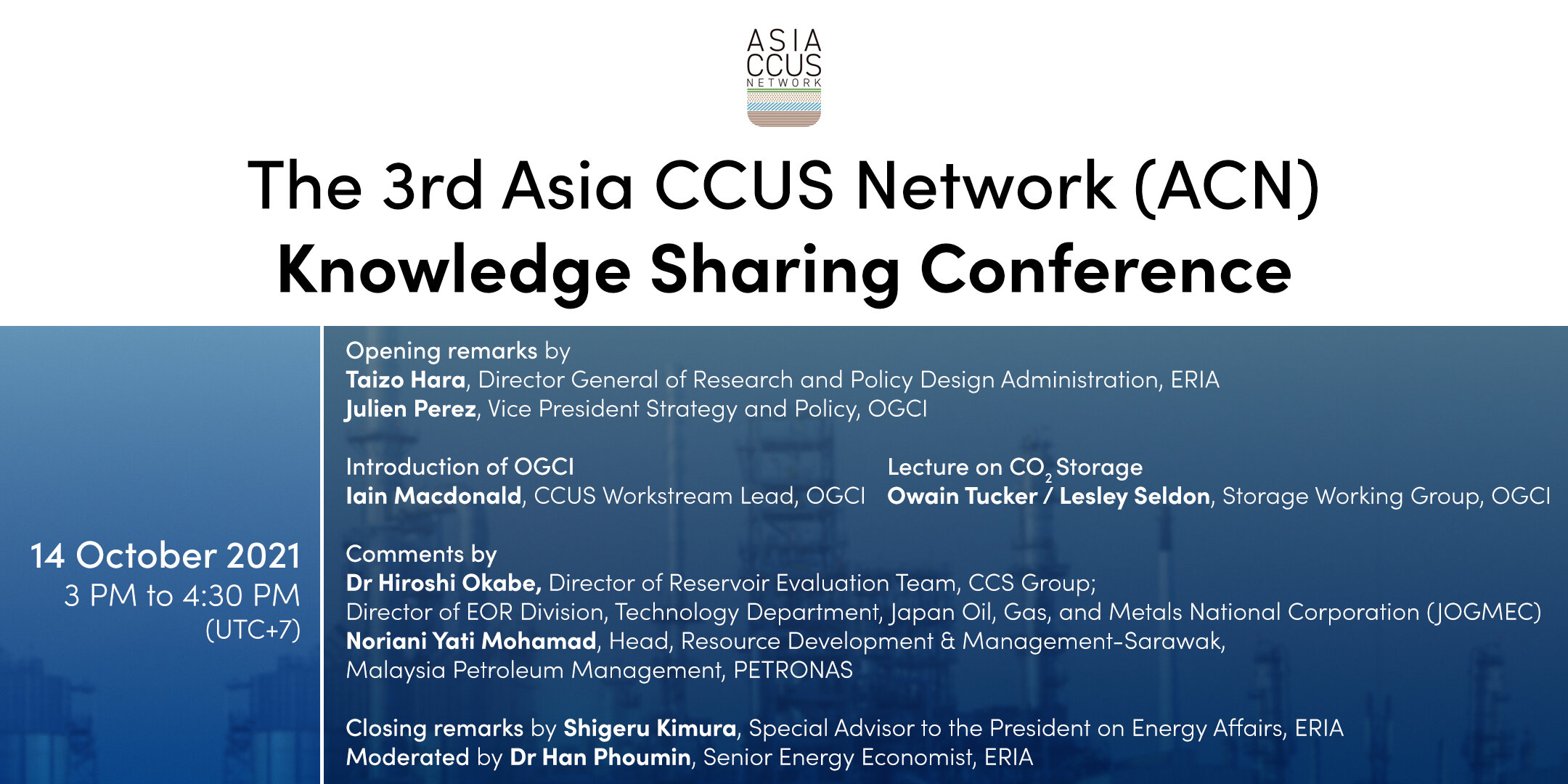
3rd Asia CCUS Network Knowledge Sharing Conference
The 3rd Asia CCUS Network Knowledge Sharing Conference hosted in collaboration with OGCI will help to bring in their collective latest studies and up to date knowledge on CCUS in Asia, specifically on CO2 storage, which can facilitate an increased understanding of project finance risk related to sequestration.
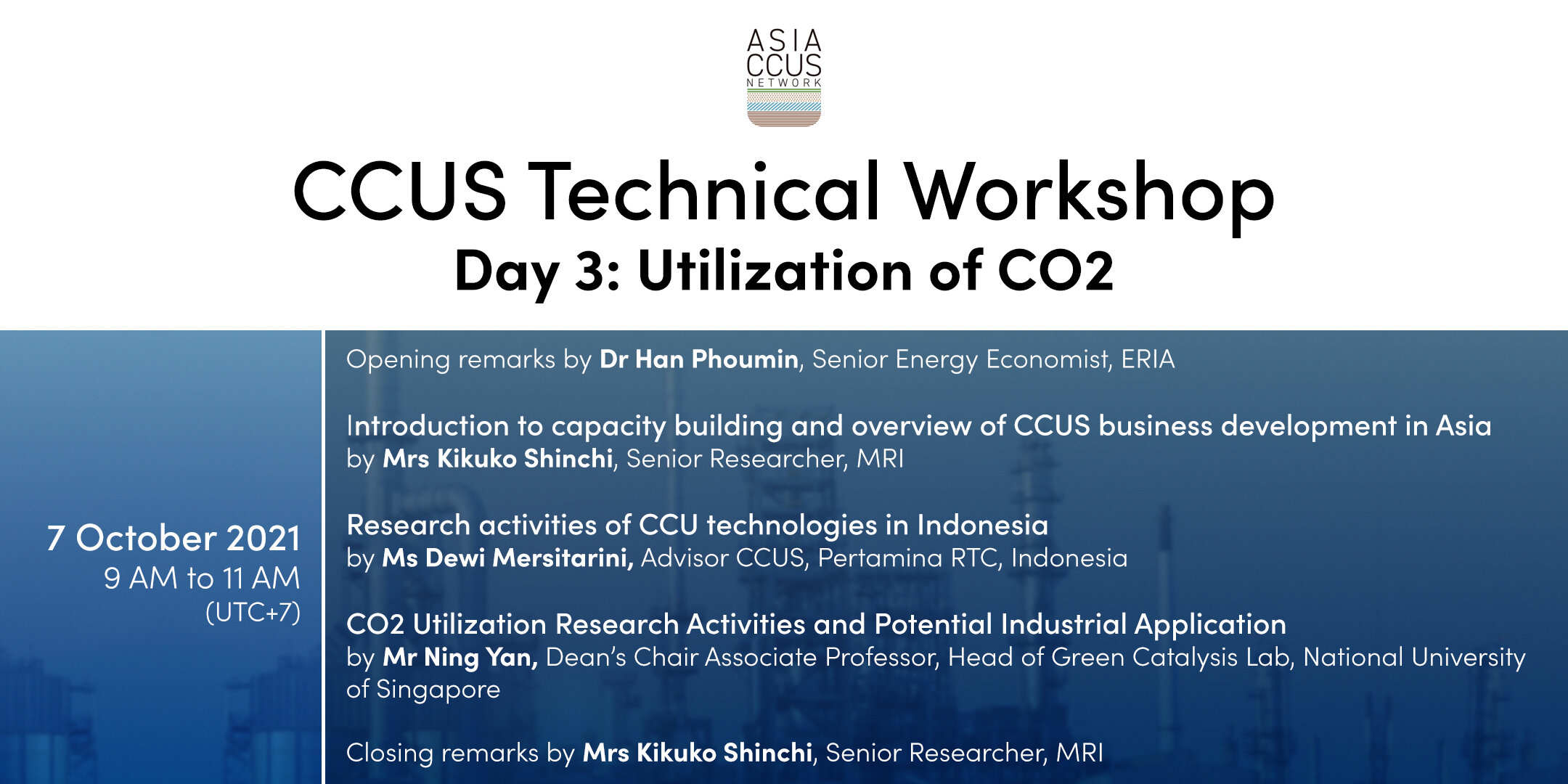
CCUS Technical Workshop: Utilisation of CO2
Ms Dewi Mersitarini, Advisor CCUS, Pertamina RTC, Indonesia to present the research activities of CCU technologies in Indonesia.
Prof Ning Yan, Dean’s Chair Associate Professor, Head of Green Catalysis Lab, National University of Singapore to present CO2 Utilization Research Activities and Potential Industrial Application.
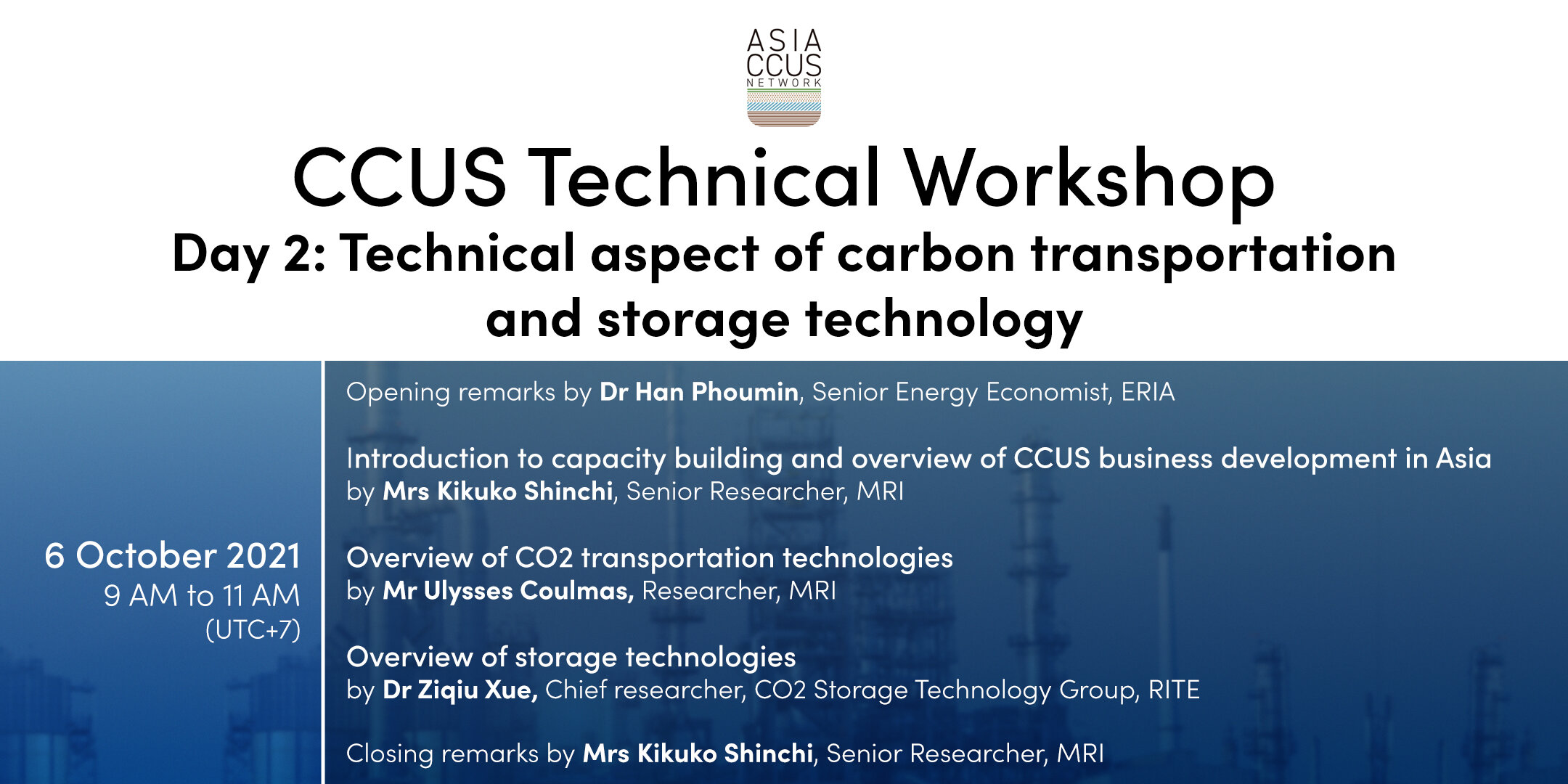
CCUS Technical Workshop: Technical Aspect of Carbon Transportation & Storage Technology
Mr Ulysses Coulmas, Researcher, MRI to present an overview of marine/pipeline transportation technologies.
Dr Ziqiu Xue, Chief researcher, CO2 Storage Technology Group, RITE, to present an overview of storage technologies.
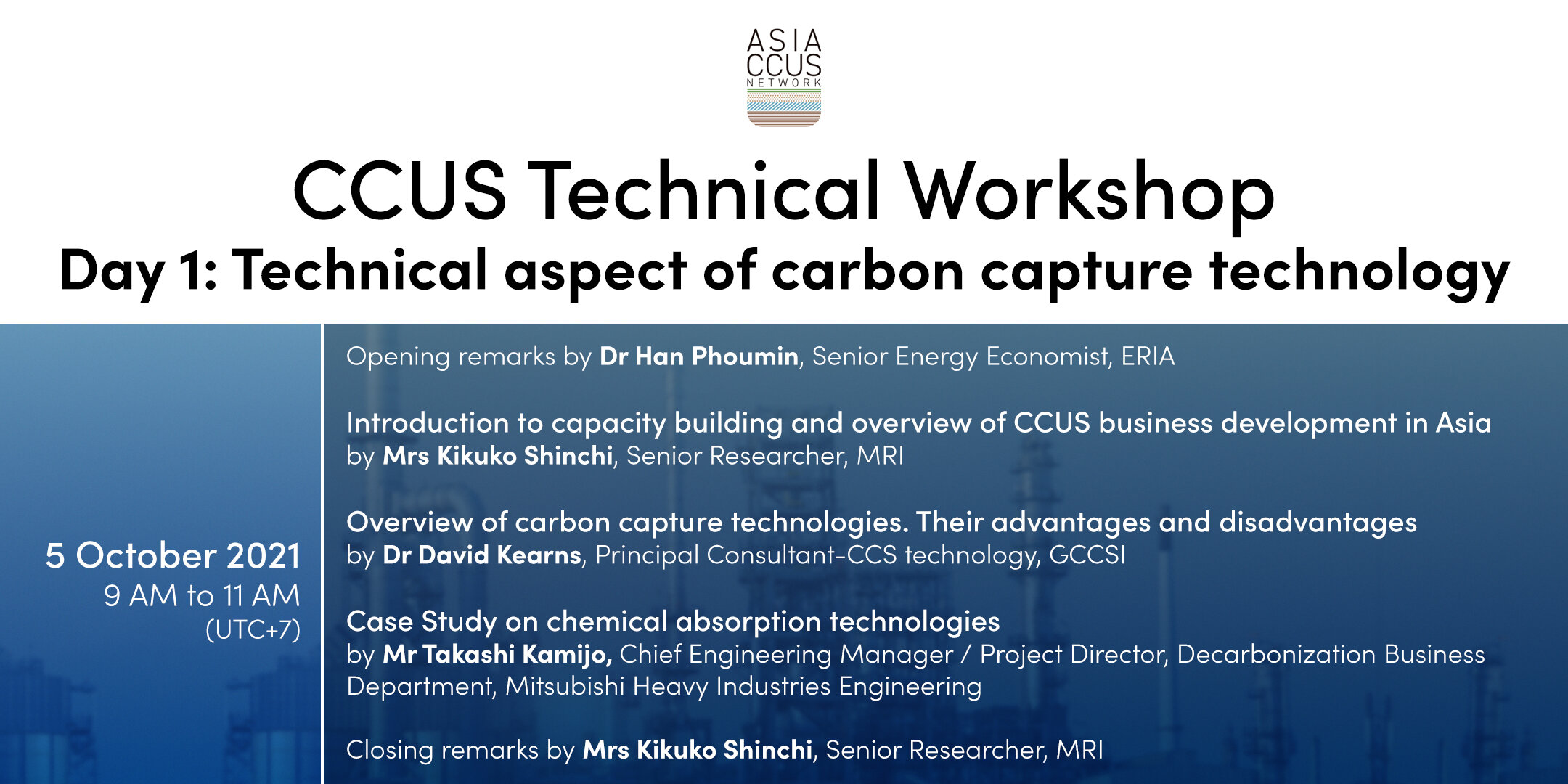
CCUS Technical Workshop: Technical Aspect of Carbon Capture Technology
Dr David Kearns, Principal Consultant-CCS Technology, GCCSI to present an overview of carbon capture technologies.
Mr Takashi Kamijo, Chief Engineering Manager/ Project Director Decarbonization Business Department, Mitsubishi Heavy Industries Engineering to discuss a case study on chemical absorption technologies.
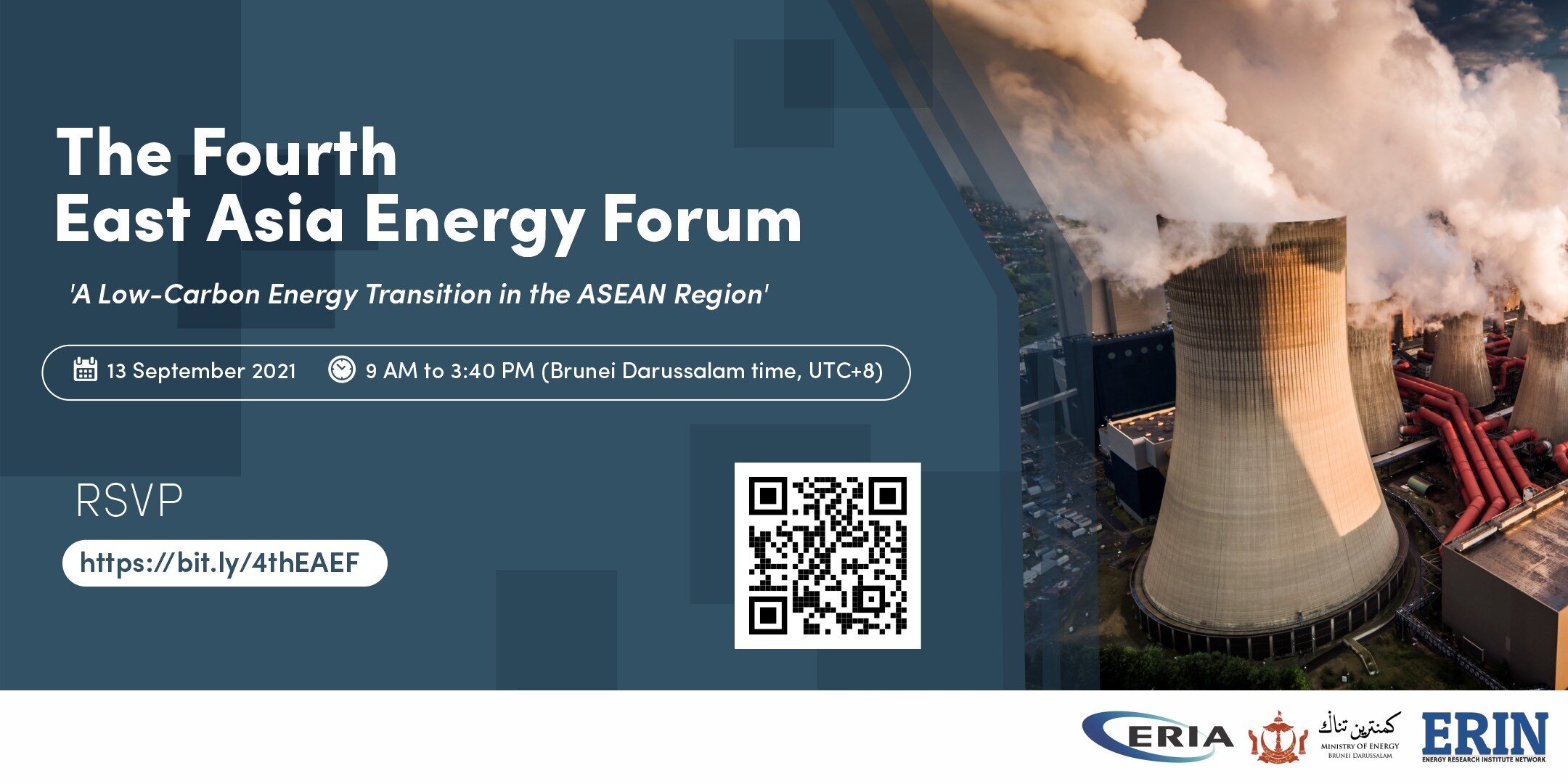
4th East Asia Energy Forum
The Fourth East Asia Energy Forum, ‘A Low-Carbon Energy Transition in the ASEAN region’, co-hosted by ERIA and Ministry of Energy, Brunei Darussalam, will discuss the current status and holistic low carbon energy transition towards the ultimate objective of carbon neutrality in the EAS region with a particular focus on the ASEAN region
The Forum will be privileged to have an opening address by H.E. Dato Seri Setia Dr Awang Haji Mat Suny bin Haji Md Hussein, Minister of Energy, Brunei Darussalam and H.E. Dato Lim Jock Hoi, Secretary-General of ASEAN. ERIA also aims to have keynote speeches by ministers from ASEAN 9 countries, Australia, Japan, and the United States.
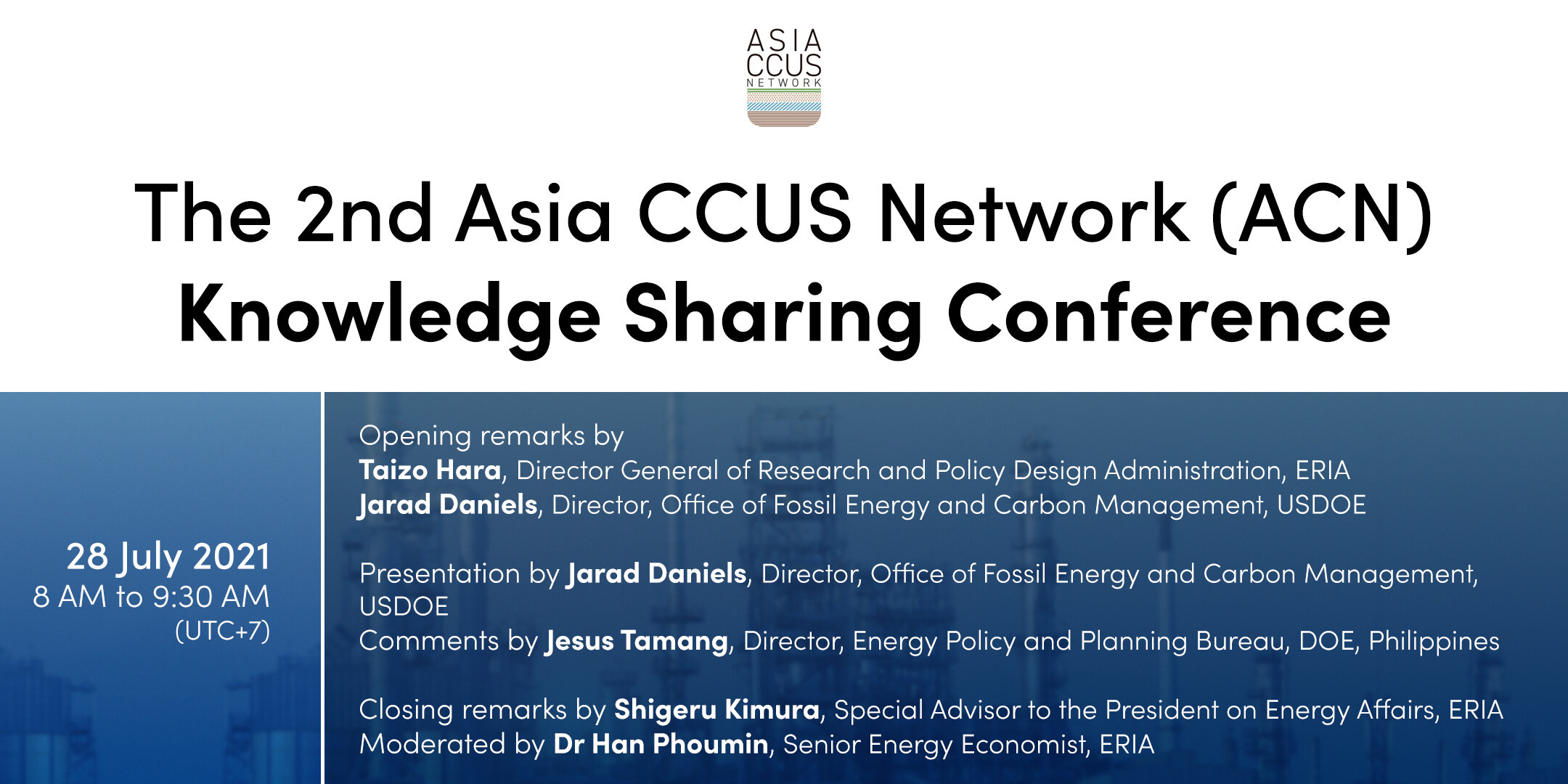
2nd Asia CCUS Network Knowledge Sharing Conference
At the 2nd Asia CCUS Network (ACN) Knowledge Sharing Conference, the Asia CCUS Network is very pleased to invite experts from the Department of Energy, United States of America (USDOE) to share their insights and experiences about CCUS development and policy to support the deployment of CCUS technology.
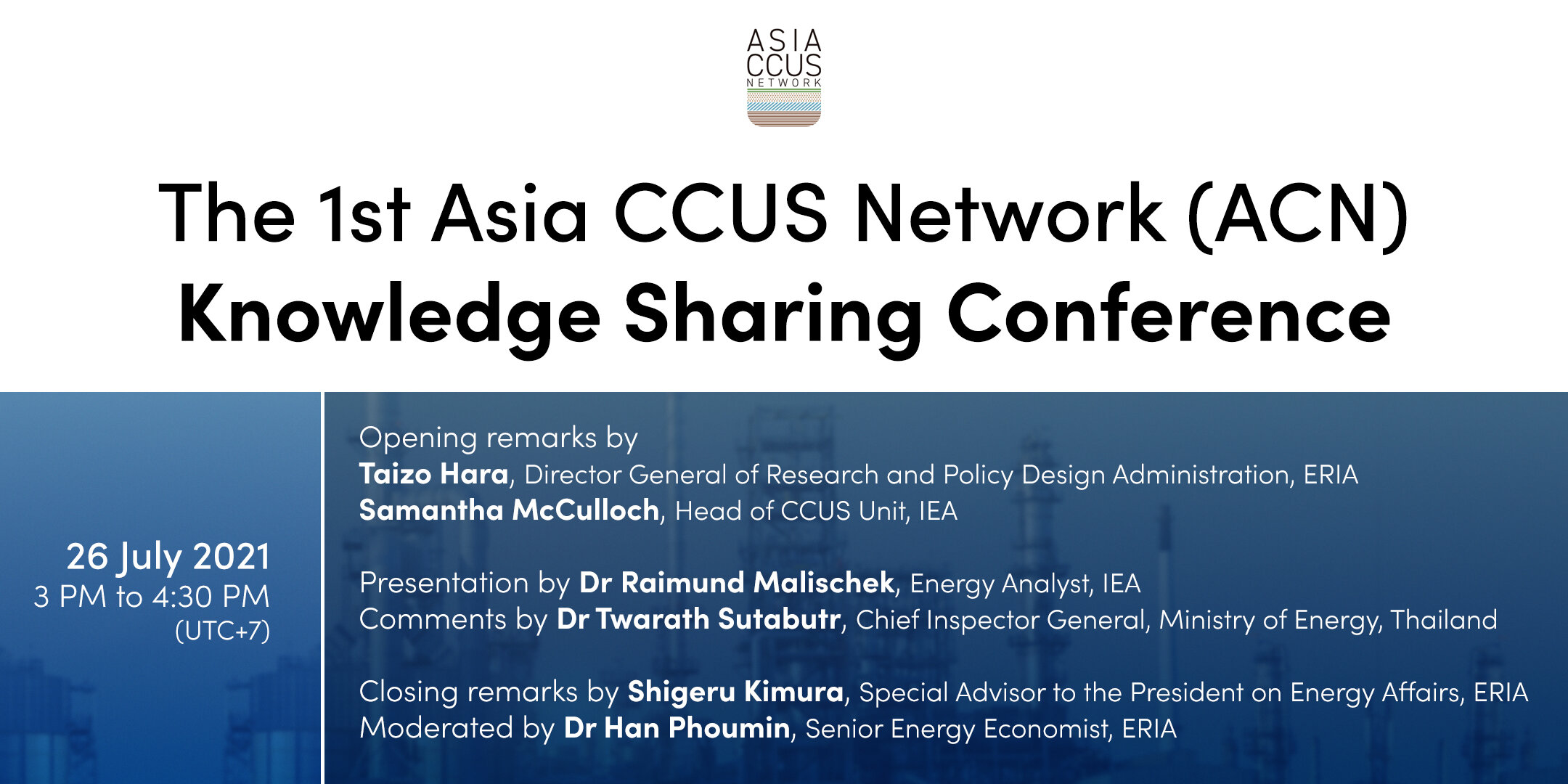
1st Asia CCUS Network Knowledge Sharing Conference
At the 1st Asia CCUS Network (ACN) Knowledge Sharing Conference on 26 July, the International Energy Agency (IEA) will introduce the recent IEA’s published report on 'CCUS: The Opportunity in Southeast Asia', which gave a whole emphasis and focus on ASEAN region. Stakeholders in Asia have to gain more awareness and understanding of the future opportunity for clean technologies such as CCUS for carbon abatement as part of the pathway to carbon neutrality.
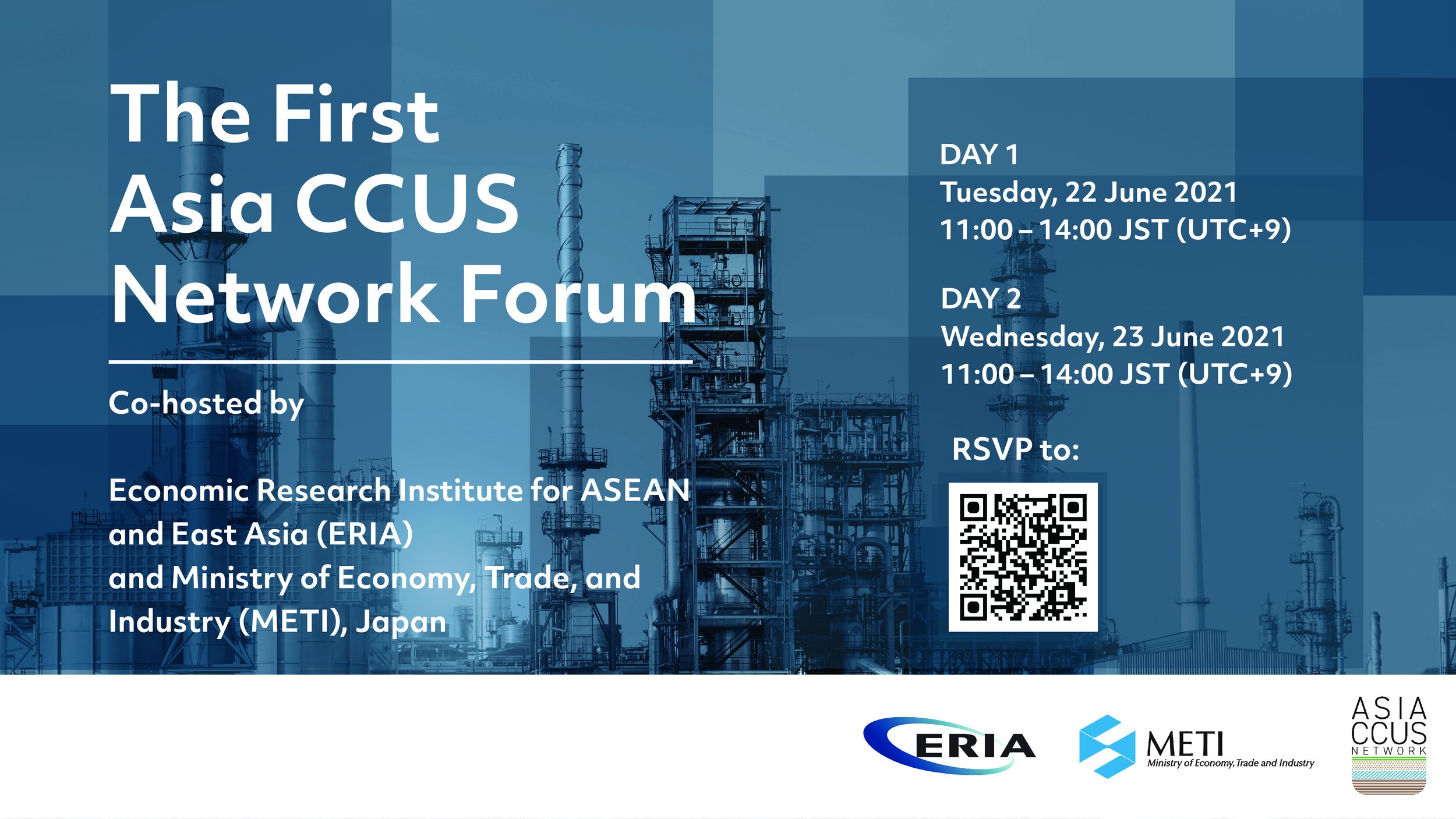
1st Asia CCUS Network Forum
The 1st Asia CCUS Network Forum aims to share insights amongst government officials, business and private sectors, academics, and experts on the possible changing energy landscape towards cleaner energy system through technologies such as CCUS.

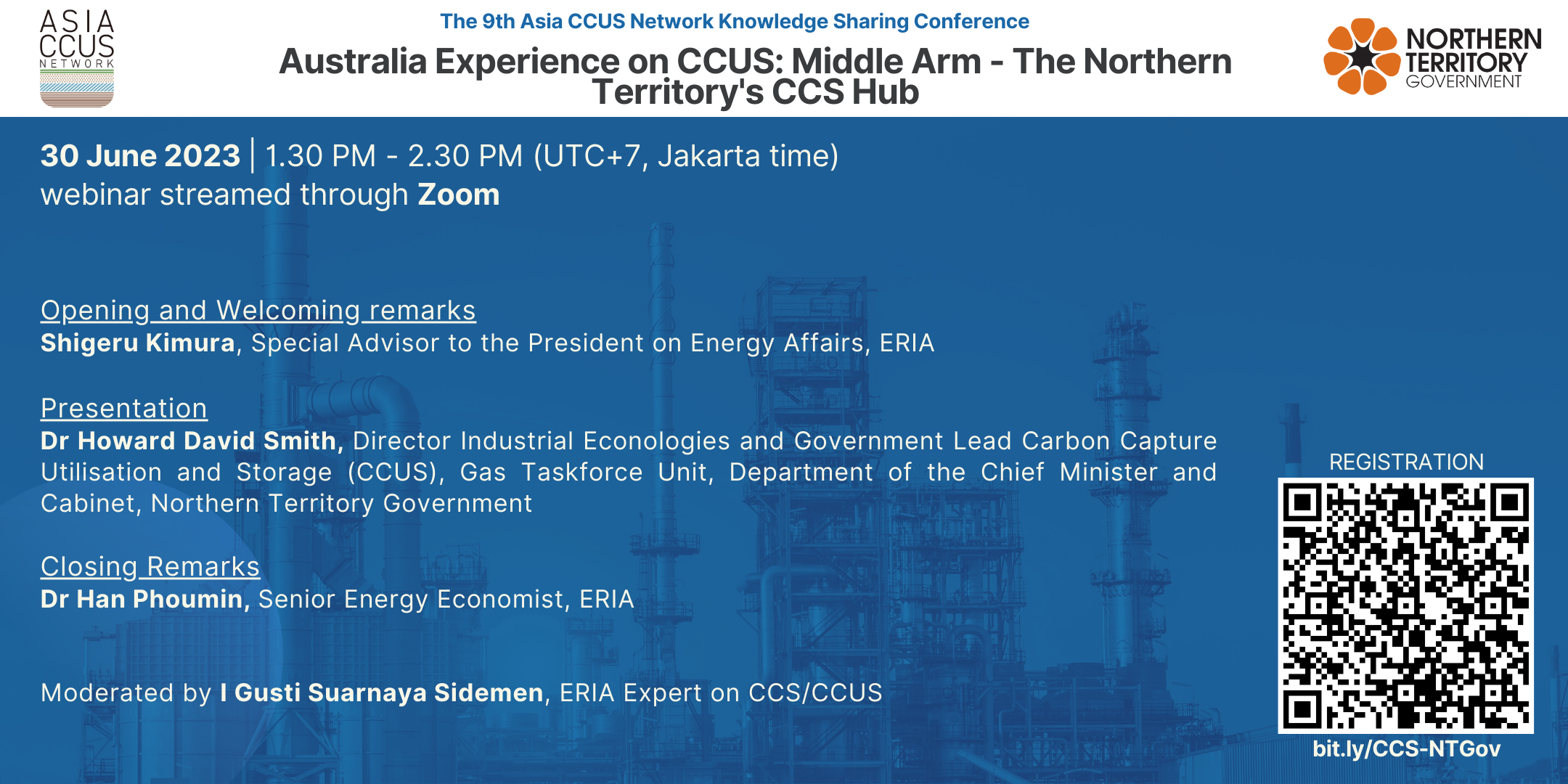

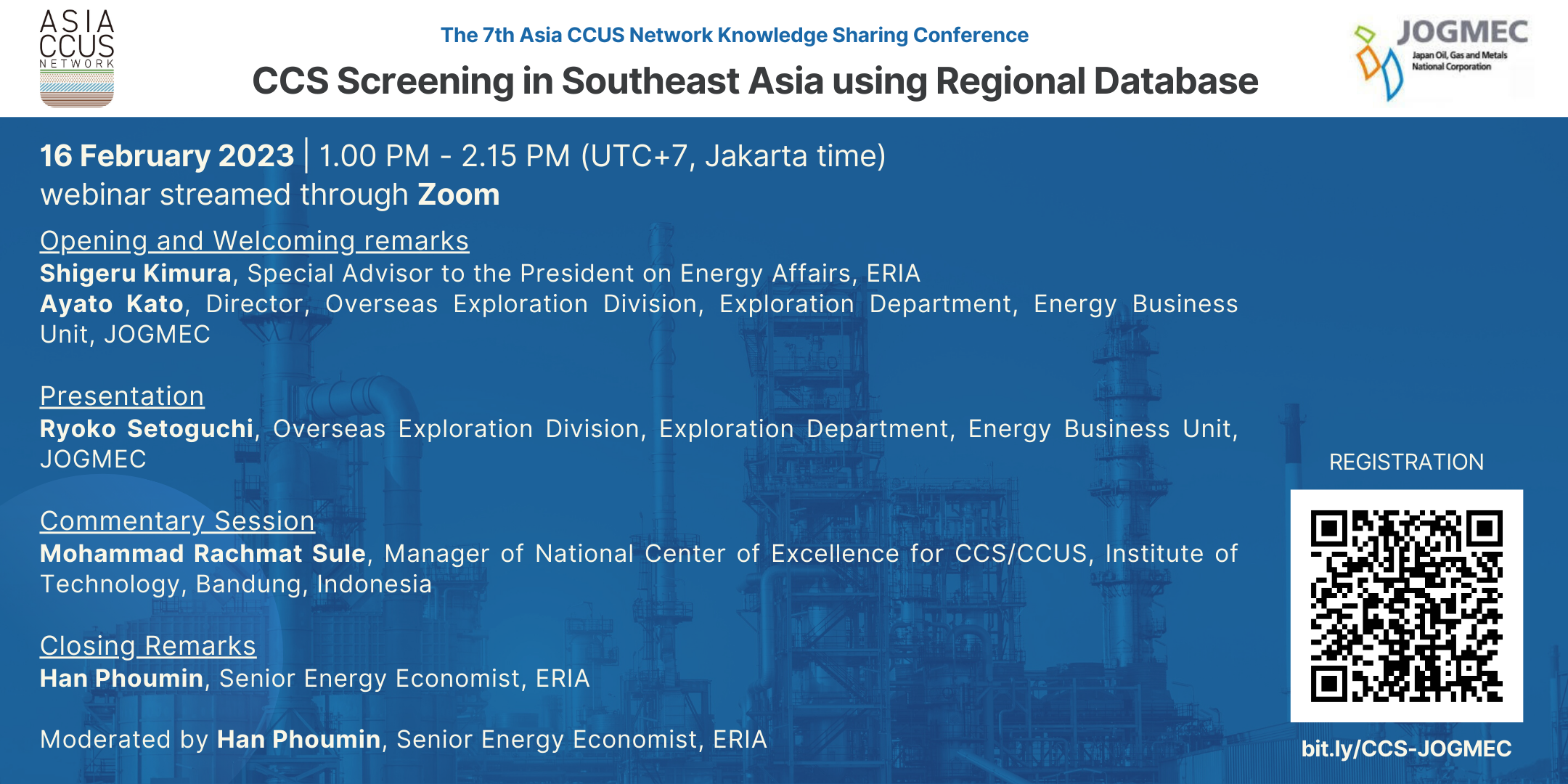
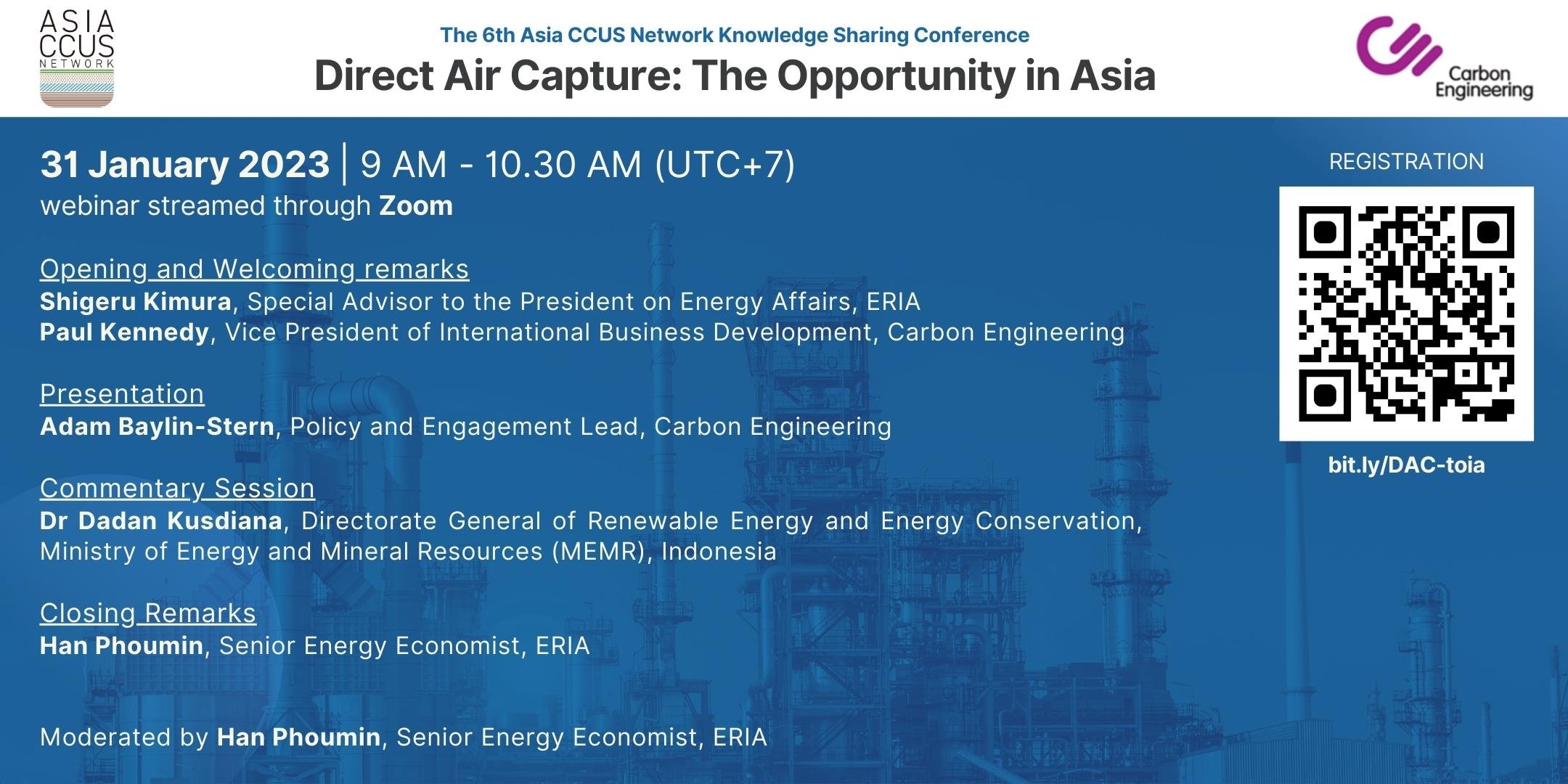

.png)


